Opening Doors
How Mitchell Hamline continues to expand access to legal education

MITCHELL HAMLINE SUMMER 2023
Dear Alumni,
For more than a century, Mitchell Hamline and its predecessor schools have focused on a few central ideas. One is to always look for ways to give more people the chance to attend law school. Another is equipping our students with the real-world skills they’ll need to be successful attorneys. One of my colleagues recently heard from a student with a lot of experience in our clinics. She said she couldn’t imagine graduating law school without knowing how to file certain forms or write legal documents that she had learned to do. While more law schools do offer the kinds of clinical experience we have for a half century, there are still students who earn their degrees but don’t have those day-to-day skills they’ll need on day one as a licensed attorney.
Everything we do honors that history. Even when it takes new forms, like our groundbreaking initiative last year to enroll the first currently incarcerated students at any law school in the country, we are honoring the history of access to legal education and equipping students with the skills they’ll need on the day they graduate. You’ll read more about these tenets in this magazine.
I’m so proud of the progress we’ve made in my three years as president and dean, including navigating the school through the COVID pandemic.
Last year, we had the best first-time bar passage rate since the Mitchell Hamline combination in 2015, all thanks to incredible professionals who continue to work closely with students during and after their time here. Even as we celebrate that bar passage, we’ve also been part of important discussions about reforming the bar exam and attorney licensing (see page 8).
We expanded our legal writing program by moving away from adjuncts to having full-time faculty, which helped us provide more time and individualized feedback to our students on one of the most important skills every attorney uses.
We began the Visiting Assistant Professor program to help diversify the legal academy and have dramatically increased our student, faculty, and staff diversity. We also added tenured faculty for the first time since 2015, adopted a tenure code, and founded the first-ever center at a law school focused on Black life and the law. We are positioning ourselves as a nation-leading law school in bolstering awareness of wellness in legal education and the legal profession.
In the last three years, we doubled alumni participation in annual fund giving. We also made important updates to our building, including our HVAC and IT systems.
I recently informed our board of trustees that I would not seek a second contract. I’ve loved this work and am ready for my next chapter. After I leave the dean’s suite in summer 2024, I will return to teaching at Mitchell Hamline. A search process is underway; one way to stay informed is to sign up for our monthly e-newsletter at mitchellhamline.edu/alumni.
I’m proud of all we’ve accomplished during my time, and I’m grateful for all the support you show our incredible students through your financial support and personal involvement in our school. Thank you.
Sincerely,
Anthony S. Niedwiecki President and Dean

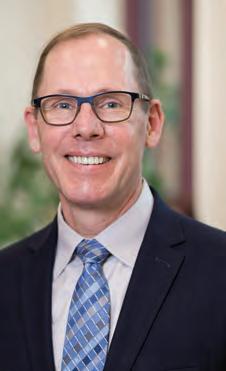
A Message from the Dean
Mitchell Hamline offers several enrollment options for students to let law school fit their lives. There are full-time and part-time options, as well as options that include attending entirely in-person or partially online. Blended-learning students come to campus at the beginning and end of each semester for several days of in-person learning; they complete the remainder of their studies through an online structure. This variety allows more people to find ways to make law school a reality in their lives Story, Page 4.
Paving the Way
How Mitchell Hamline continues to innovate in a variety of ways to expand access to law school

Not Giving Up
Three days after passing the bar exam, Shantel Thompson’s life changed forever. But her perseverance remains as strong as ever.
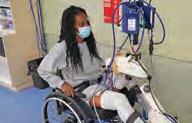
The Judge’s House Calls
Judge Donovan Frank ’77 is the go-to guy in Minnesota for individual naturalization ceremonies for those who can’t attend larger events.
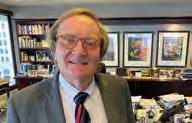
Getting off the Floor
Brandy Mai ’21 was sworn into the bar with a focus on healing and making amends.
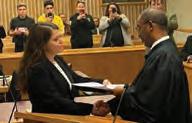
VOLUME 6
Published by Mitchell Hamline School of Law

875 Summit Avenue
St. Paul, Minn. 55105
651-227-9171
alumni@mitchellhamline.edu mitchellhamline.edu/alumni
President and Dean
Anthony S. Niedwiecki
Executive Editor
Tom Weber
Art Director and Designer
Karl Peters
Designers
John Diebel
Writers
Allison Burke
Riham Feshir
Kate Geldert
Marla Khan-Schwartz
Todd Nelson
Tom Weber
Photographers
Roosevelt Mansfield
Paul Markert
Brady Willette
Steve Woit
BOARD OF TRUSTEES
Chair
Nicole James Gilchrist ’03
Vice Chair
Jim Jacobson
Secretary
Steven J. Kirsch ’76
Treasurer
Gregory L. Buck ’87
Judge Reynaldo A. Aligada ’02
Landon Ascheman ’09
Brian Batzli ’85
Chris Chalstrom ’91
John. J. Choi ’95
Sam Clark
Gloria Contreras Edin ’05
Scott Flaherty
Jeanne M. Forneris
Judge Donovan W. Frank ’77
Patrick Garay-Heelan ’09
Judge Sara Grewing ’03
Mark A. Hallberg ’79
Dr. Linda N. Hanson
Frank V. Harris ‘75
David G. Hellmuth ’92
Jean F. Holloway
Frances L. Kern ’13
Chris Montana ’13
Christopher Pham ’09
David D. Ransom ’91
Susan C. Rhode ’85
Ugo Ukabam ’02
Wendy K. Watson ’97
Melissa Lee Wright ’93
4 10 11 32
LAW
MITCHELL HAMLINE
AROUND MITCHELL HAMLINE
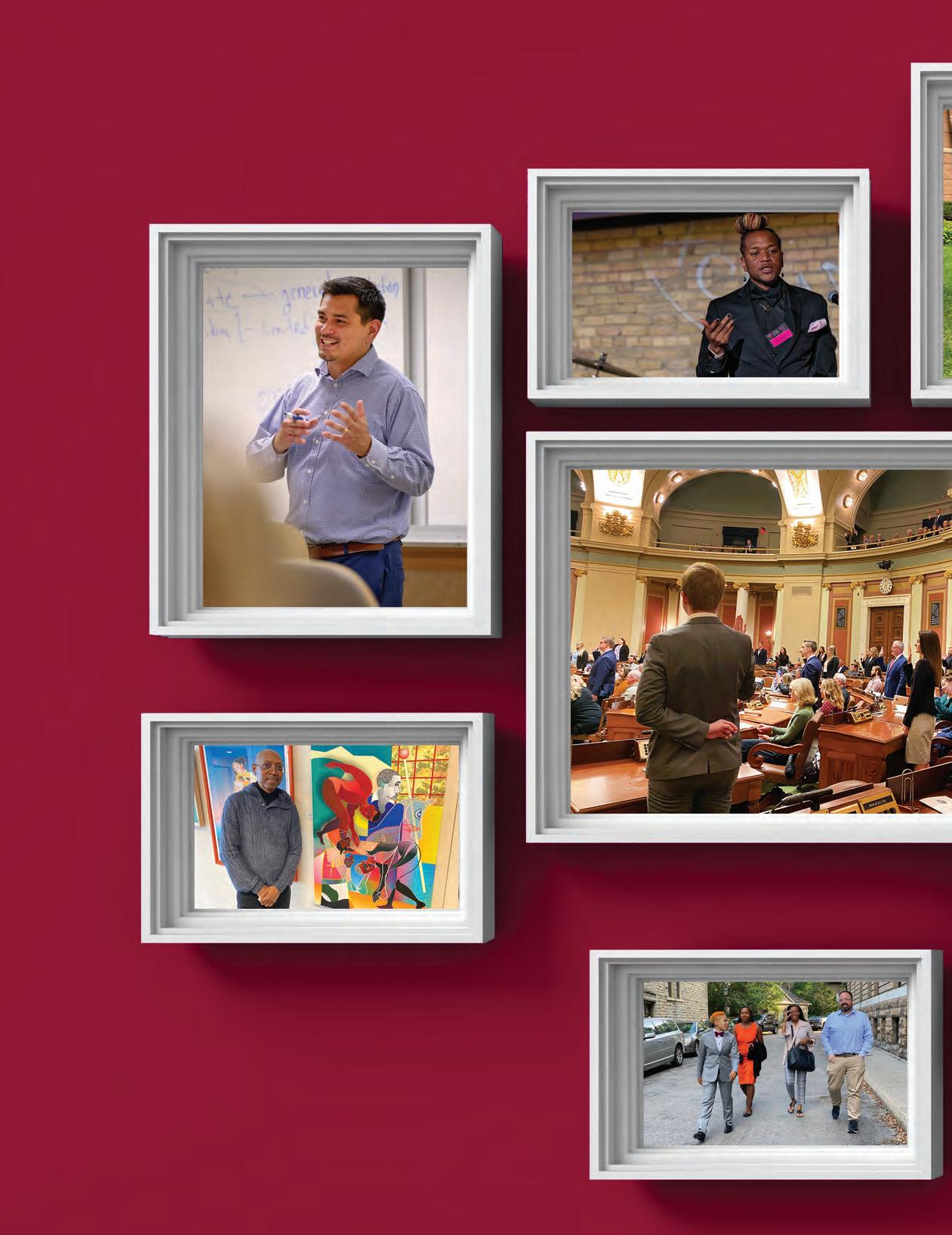 Professor Forrest Tahdooahnippah (Comanche Nation) teaching a class, September 2022
Professor Dr. T. Anansi Wilson speaks at the launch gala for the Center for the Study of Black Life and the Law, February 2023
Many of the 131 alums who passed the Minnesota bar in July attended a swearing-in ceremony at the state capitol, November 2022
St. Paul artist Donald Walker showcased his work in the art gallery, March 2023
Professors Carson, Strachan, Brantley, and Cobb set a style standard on their way to campus for the first day of class, August 2022
Professor Forrest Tahdooahnippah (Comanche Nation) teaching a class, September 2022
Professor Dr. T. Anansi Wilson speaks at the launch gala for the Center for the Study of Black Life and the Law, February 2023
Many of the 131 alums who passed the Minnesota bar in July attended a swearing-in ceremony at the state capitol, November 2022
St. Paul artist Donald Walker showcased his work in the art gallery, March 2023
Professors Carson, Strachan, Brantley, and Cobb set a style standard on their way to campus for the first day of class, August 2022
MITCHELL HAMLINE LAW 2
These four first-year blended-learning students are all from Los Angeles and met up on campus at the start of the school year. (L-R): Gustavo Flores, Marlene DiegoFlores, Nick Gamiz, and Chelsea Oruche, August 2022
Several alums and friends of Mitchell Hamline joined Dean Niedwiecki to offer personal experiences on what it's like to be a judge and to give advice on seeking work in the judiciary, March 2022
David McNabb ’22 of New Mexico wasn’t the only McNabb graduating last spring. While he graduated from Mitchell Hamline, his son Mac also graduated from kindergarten, May 2022
We held a ribbon cutting to open a new wellness center on campus for students, faculty, and staff, May 2022

3 MITCHELL HAMLINE LAW
Paving the Way
BY TOM WEBER
Michelle and Chris Furrer nearly g ave up on law school because the commutes to the nearest law schools would be too long. The married couple lives and works on Chris’ family’s thirdgeneration cattle farm in rural Monroe, Washington, the town where they grew up.

Then they discovered Mitchell Hamline’s blended-learning enrollment option, which lets students attend partially online. Michelle left her teaching job to focus on law school and the farm, while Chris balanced school, the farm, and a remote job.
“It’s been such a gift to attend together,” said Michelle Furrer ’23, who graduated this spring. “It’s a difficult degree, but we really feel Mitchell Hamline strives to work with second-career students like us.”
For more than a century, Mitchell Hamline and its predecessor schools have been rooted in the idea that law school should be available to more people, not fewer. The first law schools in Minnesota to offer night classes and a weekend program are part of that history, which allowed students with jobs to attend part-time. The addition of a day program opened law school to more people, including women. And last decade, Mitchell Hamline became the first ABA-approved law school to offer a partially online enrollment option, which expanded legal education across the globe.
“Law school is hard enough to get into without barriers that have nothing to do with your academic ability,” said President and Dean Anthony Niedwiecki. “Where you live, for example, shouldn’t keep someone from applying to law school.
“Our work today is an extension of what we’ve done for more than a century–always being on the lookout for new and innovative ways to introduce more people to the idea of law school that fits their lives.”
“ We had different experiences in law school, which is indicative of how Mitchell Hamline can fit a number of different lifestyles and circumstances.”
The blended-learning option is just one example. Another is the Gateway to Legal Education program, which began in 2019 to expose students from historically underrepresented backgrounds to law school. Students at partner undergraduate institutions earn college credit by taking Mitchell Hamline courses.
Oliver Nelson, a junior at North Hennepin Community College, took a course on psychology, race, and law last fall featuring Mitchell Hamline
MITCHELL HAMLINE LAW 4
Mitchell Hamline continues to innovate in a variety of ways to expand access to law school.
Michelle Furrer ’23
Professor Rick Petry ’98. Now, Nelson wants to go to law school.
“I’ve made mistakes in my life, and all I’ve wanted at those moments was for people to understand my story,” said Nelson. “When I become an attorney, I hope to give that grace to my clients.”
There’s also the North Star Scholarship, which is for blended-learning students who intend to practice in areas underserved by local lawyers.
Carrie Backman ’22 graduated first in her class last year, then returned to western Minnesota, where she and her husband grew up. She joined the firm Fluegel, Anderson, McLaughlin, & Brutlag and has worked on agricultural cases, including Chapter 12 bankruptcies. “My husband works in ag, so relocation was not a viable option for law school,” she said. “If it weren’t for Mitchell Hamline, I would have had to face some tough choices between my personal and professional life.”
Meeting students where they are
At Mitchell Hamline, expanding access doesn’t end with the application process. The school works with students when they arrive to ensure success. A new wellness center opened last year amidst several efforts to remove non-academic barriers from studies.
“Law school has long been thought of as this ‘sink or swim’ place that’s purposefully hard because being an attorney is hard,” said Dean of Students Lynn LeMoine ’11. “But it’s important to shift that paradigm because we know students and lawyers can thrive with the right systems of support.”
Matthew Overcast ’22 transferred to Mitchell Hamline because of its disability services. Overcast is neurodiverse and had long struggled with things like reading, writing, and auditory processing—but he wasn’t diagnosed until attending a previous law school.
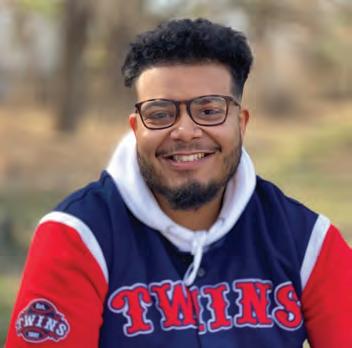
Unfortunately, Overcast said, he struggled to get what he needed. “My experience in higher education has been unnecessarily adversarial when I’ve requested reasonable accommodations,” he said. “But at Mitchell Hamline, everyone treated me with dignity and respect—not like a liability, a lesser person, or a stain on the profession.
“I could focus on learning the law and caring for my family like the rest of my peers, which was a breath of fresh air.”
A focus on wellness doesn’t mean law school will be easier, added LeMoine. “We want to be sure students have the resources to meet the demands of law school and thrive.
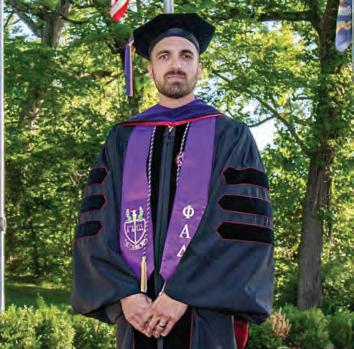
“Similarly, offering accommodations is about meeting students where they are and knowing their intellect and potential will shine with reasonable accommodations.”
Back in Washington, the Furrers are also an example of how Mitchell Hamline has continuously expanded clinics and externship opportunities to blended-learning students. Chris worked with the Minnesota Attorney General’s Conviction Review Unit through the Wrongful Convictions Clinic this year. Michelle was a legal resident to Justice Anne McKeig ’92 at the Minnesota Supreme Court. “I knew when we interviewed her that I wanted the chance to work with Michelle,” said McKeig. “And if that meant she would work remotely, so be it. She was an outstanding resident.”
“We went to law school thinking we’d one day open a firm together to serve our community,” said Chris Furrer. “What we’ve learned is there are many ways to serve your community, which is exciting.”
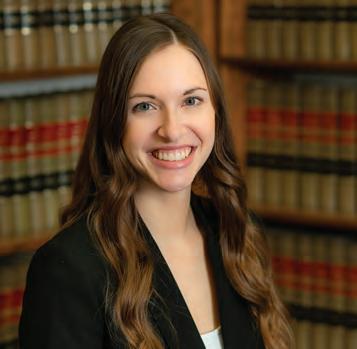
5 MITCHELL HAMLINE LAW
“If it weren’t for Mitchell Hamline, I would have had to face some tough choices between my personal and professional life.”
Carrie Backman ’22
“I could focus on learning the law and caring for my family like the rest of my peers, which was a breath of fresh air.”
Matthew Overcast ’22
“When I become an attorney, I hope to give that grace to my clients.”
Oliver Nelson
Legacy CELEBRATING
Some names have changed at the offices of Mitchell Hamline in recent years. But what hasn’t changed is our century-plus commitment to legal education.
BY TOM WEBER
Lisa Heidenreich ’92 knows room 304 at Mitchell Hamline well. It had been her father’s office for years, so she’d visited long before she was a student and, later, leading the library. But earlier this spring, she had her first meeting in the room since her father Doug Heidenreich ’61—a former dean and longtime professor—died (see story on inside back cover).
The meeting was with Kim Vu-Dinh, who joined Mitchell Hamline’s faculty last year. Vu-Dinh put her own stamp on the room, foregoing Heidenreich’s “law professor cluttered” motif for a “less is more, except for plants” feel.
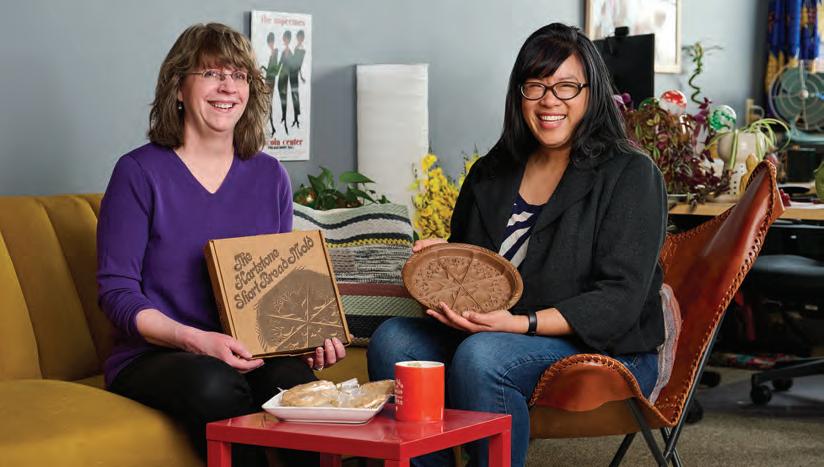
But the décor wasn’t the best surprise of the meeting. It was a plate of shortbread Vu-Dinh had made for Heidenreich, using a vintage mold that had belonged to Lisa’s father. “I was a little speechless,” said Heidenreich. “Such a thoughtful thing to do.”
The mold had come from Professor Tom Cobb, who inherited it when he purchased Doug Heidenreich’s condo in 2019. That’s the year Cobb moved from Washington to join Mitchell Hamline’s powerhouse legal writing program. He’d been inspired to look at the school after using a textbook in his classroom written by emerita professors Christina Kunz and Deborah Schmedemann.
Then last year, Cobb gifted the mold and several cookbooks to Vu-Dinh after learning of her love of baking. “It was clear pretty quickly she would get more use out of them than me,”
quipped Cobb. “I’m glad they found a good home.”
With more than a dozen new faculty hires and at least eight retirements since 2019, Doug Heidenreich’s baking molds aren’t the only hand-me-downs at Mitchell Hamline. Also being handed down is a century-plus legacy and mission for the school’s newest team members to realize in their own ways: To make law school more accessible and give students a practical education that equips them with the skills they need the day they graduate.
That ethos was celebrated this spring at an event to mark 50 years of clinical education at Mitchell Hamline and its predecessor schools. The idea of using coursework (a clinic) to give students real-world skills by working directly with clients was still novel in 1973, when Professors Roger Haydock and Rosalie Wahl ’67 started one of the first clinical education programs in the country at William Mitchell. Hamline Law began its own clinics a few years later.
Today, Mitchell Hamline offers 17 clinics, including one debuted last year by Professor Vu-Dinh. Her Economic Inclusion Clinic gives both brick-and-mortar and blendedlearning students experience representing clients working on behalf of historically disenfranchised communities in areas focusing on economic quality. They worked this year with a tribal housing corporation in Alaska and economic and
MITCHELL HAMLINE LAW 6
Lisa Heidenreich, interim director of the library, with Kim Vu-Dinh, associate professor of law
Student Experiences in Clinics
• Reviewed cases for a unit looking into possible wrongful convictions in Minnesota
• Filed patent or trademark applications for clients
• Expunged criminal records and even earned pardons
• Drafted legislation for tribal governments and contracts for nonprofit organizations
• Formed business entities for new enterprises
• Represented people in mediation and at hearings and trials, including those seeking legal status in the United States
• Argued cases before courts
community development organizations in St. Paul and New Orleans that focus on the Latino and Vietnamese communities.
“It was important to include blended-learning students to see that transactional work in economic justice is relevant across the country,” said Vu-Dinh. During its inaugural year, the clinic had students participating from Minnesota, Alaska, California, and Washington.
Mitchell Hamline’s clinical education program also has new leadership. Professor Kate Kruse, who previously led the clinics at Hamline Law before its 2015 combination with William Mitchell, co-directed the program this past year with Professor Natalie Netzel ’15. This summer, Netzel will take over as sole director.
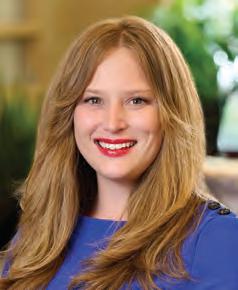

In addition to clinics, Mitchell Hamline has been on the move in recent years in several other places. The school has bolstered its legal writing program, thanks to a shift to more full-time faculty. There’s also the new Center for the Study of Black Life, led by Professor T. Anansi Wilson. The Dispute Resolution Institute debuted the Truth and Action initiative, which aims to address systemic racism in the criminal justice system in Minnesota. And the Native American Law and Sovereignty Institute debuted a certificate for students; the school has seen record Native American enrollment in recent years.
In 2022, the school became the first in the country to enroll currently incarcerated inmates. The reasoning is that no people are more affected by the law and legal systems than inmates so why not give them the opportunity to access legal education? (see next page)
Several school leaders have been serving on a Minnesota Supreme Court task force that is studying possible alternatives to attorney licensure in addition to the bar exam (see next page)—another way Mitchell Hamline seeks to bring a wider diversity of experiences into the legal profession.
And among the school’s faculty, a new faculty development committee meets regularly to hear about colleagues’ scholarship and offer encouragement.
All of this has happened while the school served as a resource during the pandemic for other law schools who needed help from a trailblazer like Mitchell Hamline in moving instruction online.
In recent years, several storied colleagues who have been game changers in their areas of expertise retired (see page 17). Their retirement parties included entreaties and declarations that the work they did to further Mitchell Hamline’s mission would be continued with every new person to join the ranks.
People like Jason Marisam, who returned to teaching in 2022 after time as a federal district court clerk and with the Minnesota attorney general’s office. Marisam found a kindred colleague at Mitchell Hamline in Professor Mehmet Konar-Steenberg, who had also previously worked for the attorney general.
The two shared an interest in administrative law, especially in state government. They co-presented a CLE last year on a Supreme Court ruling’s effect on the Environmental Protection Agency.

“I think Mehmet has been intentional in helping bring me into this space that’s an important one for Mitchell Hamline”, said Marisam. “It’s the place where we can continue to follow the development of Minnesota case law and legislative law in important ways.”
Konar-Steenberg would note Marisam’s credentials stand on their own, without his help. But he’s grateful to have Marisam as a colleague “because it means greater access for our students to someone with deep theoretical knowledge— and practical understanding— of how governments work. “That’s important because it means Mitchell Hamline can continue to be a resource for students and practitioners on this topic, and it expands our ability to serve those populations, which I find to be really at the crux of what this school was created to do.”
7 MITCHELL HAMLINE LAW
Professors Jason Marisam and Mehmet Konar-Steenberg
Professor Kate Kruse
Professor Natalie Netzel
Photographs by PAUL MARKERT
Where things stand
Over the past year, we’ve heard from alumni wanting to know more about two efforts Mitchell Hamline is part of: Reforming the bar exam and the Prison to Law Pipeline.
BY TOM WEBER
Bar Exam
In 2021, the Minnesota Board of Law Examiners began a two-year study of the bar exam. Several Mitchell Hamline leaders have sat on various working groups within the effort.
The study is the result of years of critiques across the nation that the bar exam doesn’t measure the skills needed to be an attorney and yields disparate outcomes by race. Efforts in Minnesota to change or drop the bar exam date to the early 1970s, when legislation at the state Capitol failed. “The bar exam does not fully reflect the realities of practice,” wrote Leanne Fuith ’10 in a 2021 article for Bench & Bar magazine. Fuith, Mitchell Hamline’s dean of career and professional development, was part of one of the working groups. She also noted studies that reveal gaps between pass rates of white test takers and test takers of other races and ethnicities.
“Scholars have attributed the racial gaps to the design of the bar exam, a high-stakes test that requires memorization of legal rules across a wide array of areas of law,’ she added. “Law practice today, in contrast, does not rely on rule memorization.
“In fact, most legal practitioners practice in niche areas of law and do not need to be familiar with the broad swath of laws tested on the bar exam to be considered competent in their work.”
Mitchell Hamline hosted a conference in April 2022 on the future of bar licensure. Minnesota isn’t the only state rethinking the bar exam. A similar track is nearing final approval in Oregon, where that state’s supreme court gave initial unanimous approval to creating additional paths to becoming a licensed attorney other than the bar exam.
Working closely with the Board of Law Examiners, Mitchell Hamline has submitted a proposal to the Minnesota Supreme Court that outlines a possible alternative pathway that would let applicants develop doctrinal knowledge in law school and develop portfolios that include experience in clinic, externship, or simulation courses.
The court is expected to decide whether to pursue the idea in coming months.
Learn more about Minnesota’s two-year study.
mitchellhamline.edu/barexam23
Prison to Law Pipeline
In 2022, Mitchell Hamline became the first ABA-approved law school in the country to enroll currently incarcerated individuals. The first two students, who recently completed their first year of law school, are part of the Prison to Law Pipeline, a program of two organizations—All Square and the Legal Revolution—that work extensively with currently and formerly incarcerated people.
Mitchell Hamline’s part in the program is an extension of its century-plus mission to expand the idea of who should have a chance to attend law school. There are also benefits for other students.
Earlier this spring, a third party surveyed students who took courses with the incarcerated students. Among the findings: Every single student said Mitchell Hamline should continue to admit incarcerated students, and more than 95 percent said the experience positively impacted their own legal education. “I really value their experiences, especially on topics related to criminal law,” said one unidentified student in the survey. “They are more knowledgeable about the legal process than the rest of us.”
“We have a drive and a passion to learn the law that most have never seen before because we know what it is to be in here,” said Maureen Onyelobi, one of the incarcerated students. “We know what it’s like to be on this side of the law.”
President and Dean Anthony Niedwiecki said incarcerated students are accepted if they show remorse for their crimes and meet the same admittance qualifications as all students, adding the program is an extension of higher education learning long offered inside prisons. Under its approval from the American Bar Association, Mitchell Hamline can enroll up to two incarcerated people each year for five years.
“These students want to learn the law to help themselves and others know their rights while they’re incarcerated,” said Niedwiecki. “It’s perfectly reasonable and logical to educate incarcerated people in the law because they are arguably the most affected by and interact with the legal system on a daily, even hourly, basis.
“And, as we’ve already found in just one year of doing this, every other student has gained a richer sensibility about the criminal justice legal system where many will one day work.”
MITCHELL HAMLINE LAW 8
Watch a PBS NewsHour segment about the initiative. mitchellhamline.edu/newshour
A Half Century of Excellence
Professors Roger Haydock and Mike Steenson laid the foundations for law review, clinical education
BY TOM WEBER
The 2022-23 academic year was t he 50th anniversary for professors Roger Haydock and Mike Steenson at Mitchell Hamline.
Haydock began at William Mitchell College of Law in 1970 as a part-time instructor, but it was in 1972 that he joined the faculty full time. Steenson also was hired at that time, fresh off a clerkship with U.S. District Judge Miles Lord.

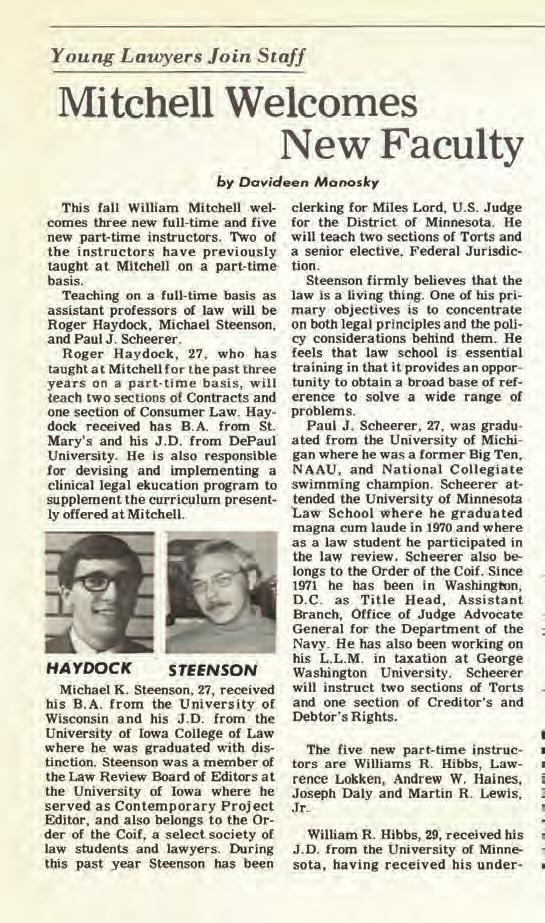
In addition to teaching, the two quickly got to work on important projects. They both attended a meeting in March 1973 where the feasibility of starting a law review was discussed. Haydock and Steenson had both served on the law reviews at their law schools. But the idea for a night school with part-time students to also run a law review was controversial because it had never been done. Steenson took up the cause and became faculty adviser.
It was hard work with no roadmap. The law review’s inaugural editor in chief continued assembling the first volume after graduating, and the 1974 edition was finally printed in early 1975. One of the student comments in that first volume was later cited by the Minnesota Supreme Court.
In 2015, Steenson oversaw another task that had never been done—the combination of two law reviews when William Mitchell and Hamline Law combined. He has continued to serve as faculty adviser as the review approaches its own 50th anniversary.

Haydock, meanwhile, took on the task of bringing clinical education to William Mitchell. After initial efforts to create a joint program with the University of Minnesota Law School fell through, Haydock and his colleagues set out alone.
“Imagine going to law school and never taking a course in really the pragmatic parts of practice, how to be a lawyer, how to practice law,” Haydock told Minnesota Lawyer this spring.
The fall 1973 semester featured the debut of four offerings from the William Mitchell Law Clinic, in criminal law, civil practice, welfare law, and criminal appeals. It was one of the first clinical programs at any law school in the country, aimed at giving students experience with real-world clients, under the supervision of faculty.
Law school wasn’t just about theories anymore; it was about learning the day-to-day skills you’d need to be an attorney. The clinical program soon became nationally ranked. “We want to be fair, reasonable, and professional. But we want the client to be successful,” he added.
Haydock worked extensively with Rosalie Wahl ’67 in the clinics’ early years, until her appointment to the Minnesota Supreme Court. Even then, Justice Wahl worked to reform rules around law students working in legal settings.
Both Haydock and Steenson have been prolific in their scholarship, literally writing the books that are used in firms and courtrooms across Minnesota and the country.
Steenson, who is also lauded for his willingness to adapt to new technology, was an early evangelist for the online learning part of Mitchell Hamline’s blended-learning enrollment option.
“No one works harder than Mike,” said one colleague, who marvels at one of Steenson’s abilities: reciting not just the names of important cases, but their full citations as well.
Steenson continues to teach Torts, one of the courses for which he was originally hired.
Haydock, a motorcycle aficionado known for his immaculate wardrobe that includes a healthy ratio of pinks and purples, has worked extensively in arbitration and dispute resolution. But even with his work outside the law school—he founded the Academy of Court Appointed Neutrals and cofounded another national organization that has changed how arbitration matters are handled across the country —Haydock, like Steenson, is known for his skills as a teacher.
“Roger’s teaching was always grounded in humility,” noted one former student. “He’d regale us with stories of his own embarrassing mistakes that he’s learned from.
“It’s refreshing to see that in a law professor.”
9 MITCHELL HAMLINE LAW
Not Giving Up
Three days after passing the bar, Shantel Thompson ’17 was shot in a random attack. Her recovery has further shown her ability to overcome obstacles.
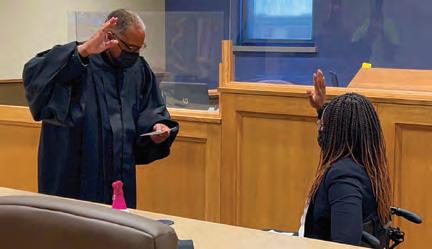 BY RIHAM FESHIR
BY RIHAM FESHIR
Shantel Thompson ’17 is the epitome of perseverance. Unfortunately, life doesn’t always appreciate that.
During law school, Thompson took evening classes then worked overnight shifts for FedEx. National Jurist recognized that dedication when it named her one of the country’s Law Students of the Year in 2017. After graduating from Mitchell Hamline, passing the bar exam became the next hurdle. She made several attempts, in both Minnesota and her home state of Nebraska.
Her perseverance paid off in October 2021. She passed the bar exam.
Thompson was elated but also at a crossroads. She’d passed the bar in Minnesota but had just been offered a job at a firm in Nebraska. She wasn’t sure what to do.
Three days later, still unsure but also exhausted after a long day of work, Thompson went to a park for a walk to clear her head.
As she walked, a man approached her. She’d never seen him but had noticed he’d been follow ing her for a few minutes. He grabbed Thompson from behind and tried to turn her around, accord ing to Thompson. But Thompson was able to break free and start running.
Her last memory is of pulling out her keys so
she could get into her car quickly. She never made it.
A shot rang out.
She fell to the ground.
Less than a week after passing the bar exam, Thompson woke up in a hospital bed to the news that she was paralyzed from the waist down. The bullet had hit her spine.
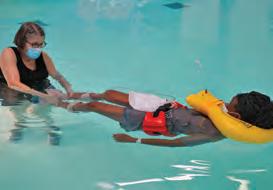

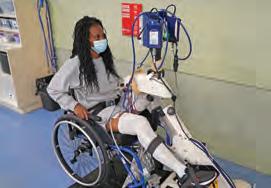
“Until it happens to you or somebody close to you, you don’t really know what that feels like,” she said.
Pretty quickly, Thompson resolved to not let the shooting stop her from reaching her goals. “This was a huge setback for me. But I still have the will to not give up.
“I’m a very strong-willed person.”
Thompson was sworn into the Minnesota Bar a few months after the shooting, but the recovery and physical therapy delayed her plans to practice law.
In the year-plus since the shooting, she’s regained some movement in her legs. “They told me I’d never move,” she noted.
Professionally, she was also sworn into the Nebraska Bar and spent time at a firm at a firm as a clerk and attorney. Thompson is now looking for new opportunities.
Thompson credits her mentor, Adine Momoh ’09, and the Mitchell Hamline community for supporting her during
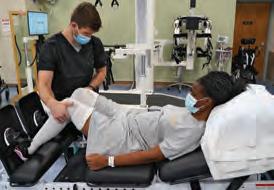
the toughest time of her life. Momoh, who recently joined the U.S. Attorney’s office in Minnesota, keeps in touch with Thompson and started a GoFundMe page to raise money for medical bills.
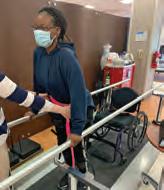
Momoh remembers not sugarcoating things and pushing Thompson to not let anyone tell her that practicing law was not for her. “I don’t like it when people make judgements,” said Momoh. “People assume that just because you come from a particular background, or look a certain way, or maybe in school you didn’t perform the best, that all of a sudden you can’t do something.”
Thompson also keeps in contact with several people at Mitchell Hamline, seven years after graduating. Practicing law was always her goal and “helping people with the law is an area I thought I would be successful in,” she added.

And while the shooting did not happen while Thompson was a student or even a recent graduate, she thinks back on how Mitchell Hamline responded to it.
“I’m forever grateful for the support.”
ALUMNI NEWS
Riham Feshir is
a
freelance writer in the Twin Cities.
10 Rehabilitation photographs submitted by MADONNA REHABILITATION HOSPITALS
A judge’s pledge to make house calls
BY TOM WEBER
Zhengfang Liu lived in the United States for 20 years before becoming a citizen last year. But because of the 82-year old’s declining health, including four hospitalizations and a cardiac arrest in the past year, Liu couldn’t attend a naturalization ceremony in person.

So the ceremony went to her, in the person of U.S. District Judge Donovan Frank ’77.
Frank, who is also a Mitchell Hamline trustee, packed his judge’s robe and necessary paperwork and drove to Liu’s home in Rochester, Minn. With family gathered around, Frank administered the Oath of Allegiance in the living room.
Liu’s son, Hao Wang, said it was his mom’s dream to become an American. “She is very proud of it,” he said. “We greatly appreciate Judge Frank!”
In most cases, new Americans take their oaths in groups at large venues, where an atmosphere of joy permeates as families snap photos and shed tears of happiness for their loved ones. But some people are physically unable to attend or can’t wait until the next ceremony. A military member with imminent orders. A pregnant woman hospitalized with a heart condition. Or, in most cases, someone who is terminally ill.
About a year after becoming a federal judge in 1998, Frank became liaison for emergency proceedings in the District of Minnesota.
When U.S. Citizenship and Immigration Services learns of an applicant who needs an emergency or homebound ceremony, they contact Frank’s office to arrange a time. Frank has administered the oath at bedsides, in hospital rooms, and even in his chambers. Fellow judges enthusiastically step in when he’s unavailable.
Now aged 71 and a senior judge, Frank enjoys the role too much to give it up.
“I can’t capture for you what it means for the families, the new American, and for me to be in those situations,” said Frank. “Many times, I’m there because the person is close to death, and it’s their last wish to die an American.
“It’s one of the truest privileges of my life.”
It’s also rare. Of the thousands of people who become citizens each year, Frank estimates he’s performed fewer than 50 homebound ceremonies in 25 years on the bench.
Looking out on the Mississippi River from his chambers in the Warren Burger Federal Courthouse in St. Paul, Frank points to the spot in the room where a soldier born in Somalia became an American so he could deploy to Afghanistan.
Frank asked the soldier why he’d fight for a country where some people think he should just go back to Somalia. “This country saved my life,” Frank recalled the soldier saying.
“This is my way of saying thank you.”
Amidst a bevy of photographs throughout his chambers are several from these ceremonies, which Frank says are some of the truest moments of him living his oath as a judge—to administer justice without respect to persons and do equal right to the poor and to the rich.
Once the oath is done, by law that person is an American—regardless of how long it takes to process the paperwork. That’s the moment when Frank says the same thing at every ceremony:
“The United States of America is now a better country than it was a few moments ago before you became a citizen.”

THE 11 MITCHELL HAMLINE LAW
“It’s one of t he truest privileges of my life.”
Judge Donovan Frank
ALUMNI NEWS
Judge Donovan Frank with Zhengfang Liu
Alum wins largest jury award ever in Minnesota
BY TODD NELSON
Michael
Collyard ’00 won a jury verdict of nearly $564 million, the largest in Minnesota history, in part by zeroing in on evidence that wasn’t in court—millions of pages of destroyed documents.
The result came in a case arising from one of the biggest financial scams in U.S. history and the largest in Minnesota, Tom Petters’ multibillion-dollar Ponzi scheme.
With Collyard, a Robins Kaplan partner, serving as lead trial counsel, a federal jury in November ordered BMO Harris Bank to pay bankruptcy trustee Douglas Kelley $484 million in compensatory damages and $80 million in punitive damages. Prejudgment interest dating to 2012 could raise the total to more than $1 billion.
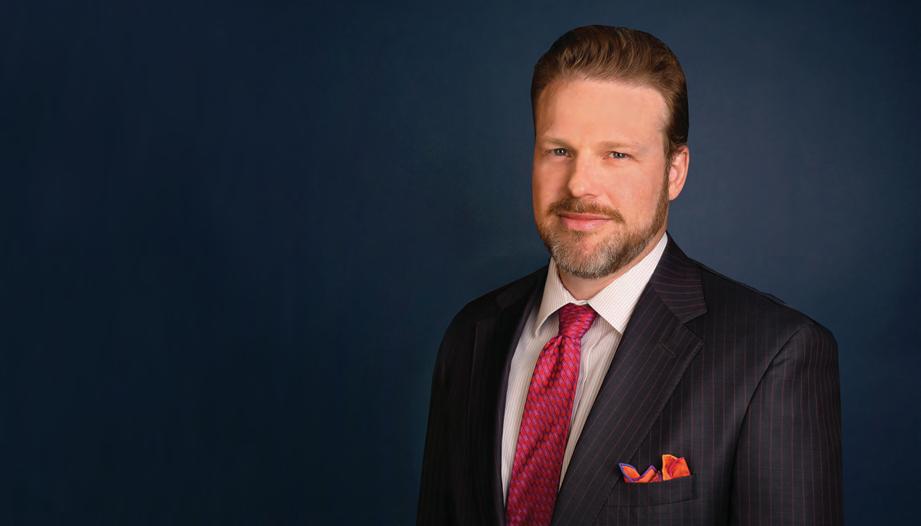
Jurors found BMO liable for aiding and abetting breaches of fiduciary duty on the part of predecessor M&I Bank. Petters, serving 50 years in prison, and the company laundered nearly $74 billion through M&I between 2002 and 2008. BMO acquired M&I in 2011.
“We are very pleased with this verdict,” said Kelley, in a statement. “We are eager to get these funds to those creditors and investors who were victims of Tom Petters’ fraud.”
Based on a post-discovery email, Collyard eventually learned that in 2014 BMO had found but destroyed six backup tapes of Minnesota records. BMO was under federal order to keep any records it found.
At trial, Collyard got a BMO official to admit during cross-examination that the destruction occurred. The judge gave jurors an adverse inference instruction, allowing but not requiring them to assume that the destroyed documents were detrimental to BMO.
“I did my best to paint a picture for the jury that they were not being truthful,” Collyard said, including using BMO officials’ own words from deposition videos and transcripts.
The case was “incredibly fun and amazing,” he added, despite fighting at every turn for evidence and facing five opposing law firms.
“To get that type of recovery, to understand that the jury sat there for a month and really listened and came to the right conclusion, I can’t even describe it.”
Collyard attended Hamline University School of Law after working for an alum during college. “I loved that it was practical and I loved that it was small,” he said.
Two adjuncts—former Hennepin County District Judge Allen Oleisky and the late Mark Gruesner ’77—“taught the best trial class ever,” Collyard said. “One thing they taught us was that you need to teach the jury in a way where when you write, they write.
“You write on a flip chart and signal to the jury that this is an important issue that you need to know.”
MITCHELL HAMLINE LAW 12 ALUMNI NEWS
Todd Nelson is a freelance writer in the Twin Cities.
“To get that type of recovery, to understand that the jury sat there for a month and really listened and came to the right conclusion, I can’t even describe it.”
Michael Collyard
ALL-STAR DEFENSE
BY TODD NELSON
Will Stute ’97 focused on humanizing a billion-dollar institution—the NCAA—to help win a landmark verdict against the widow of a former college football player who sought to hold the organization responsible for her husband’s death.
The case was essentially a bellwether, Stute said, as the first to go to a jury involving concussions and the degenerative brain disease CTE (chronic traumatic encephalopathy) in college football players. Stute leads the sports practice at Orrick, an international law firm headquartered in San Francisco.
Stute discovered his love of litigation while doing mock arguments and negotiations as a William Mitchell College of Law student. The school’s flexible schedule enabled Stute—who was raised by a single mother and put himself through college and law school—to work while getting a “great legal education that I would put up to anyone’s.”
Stute guided the Orrick team that defended the NCAA in a wrongful death lawsuit brought by the family of former University of Southern California football player Matthew Gee. Gee played from 1988 to 1992. He made camp for the Los Angeles Raiders the following year but was cut and never played in the NFL. He later started his own insurance agency.

After Gee died in 2018 at age 49, his family sought $55 million in damages.
Following a three-week trial last November, a Los Angeles jury deliberated for just a day before ruling in the NCAA’s favor. In February, a jury in Indiana rendered a complete defense in a similar lawsuit from the widow of a former college quarterback.
With hundreds of such cases still pending, testimony from NCAA officials and their concern for student-athlete health and safety helped humanize the high-profile organization.
“That’s a story that’s not front and center in the media and was really important to tell the jury,” said Stute, who is also a former Mitchell Hamline trustee.
One major question litigated in the NCAA case was whether Gee’s symptoms were caused by CTE; Stute argued they weren’t. He also told jurors not to hold the NCAA responsible for Gee’s death from sudden cardiac death because it was caused by several factors, including severe hypertension.
Stute also represents large companies in the technology, life sciences, finan-
cial services, and defense contracting industries.
His work in sports doesn’t only happen in the office. At home, he helps advise one of his sons, who plays Division I college basketball.
“I’m sitting today at my place in Miami having achieved probably more success than I could ever have imagined,” said Stute.
“That’s a message I would take to all of the students—the sky’s the limit coming from Mitchell Hamline.”
ALUMNI NEWS
Todd Nelson is a freelance writer in the Twin Cities.
Since the first bar association in Minnesota was established over a century ago, the state is now home to seventeen, with members representing various areas of law practice. This year, the three largest Minnesota bar associations were led by Mitchell Hamline School of Law alumni. We caught up with Kenya Bodden, Landon Ascheman, and Paul Peterson to ask them about their experiences as bar association presidents and share reflections about law school.
 BY MARLA KHAN-SCHWARTZ
BY MARLA KHAN-SCHWARTZ
What have you focused your time on as bar association president?
Kenya: “Volunteering as a way to improve mental health.Volunteer events and activities in the community drew me to the bar association. We practice law, but we’re also part of the community. It’s something good to do, and I get something out of it that makes me feel good.”
Landon: “Increasing access to justice. We also focus on getting diverse representation by making sure seats at the table are filled by people who are not already at the table.”
Paul: “Working to support an increase in state funding for our justice system—everything from pay for judges and law clerks to work matters. We’re also trying to actively develop future leaders from our current membership.”
Most important role bar associations play for attorneys?

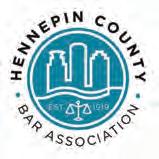

Kenya: “It’s a way to network and get to know people’s social events. And law students get to know people who
are potential employers, or references to future employers.”
Landon: “Connections with community members in and out of our individual practice areas. There are opportunities to promote needed changes to statutes, rules, policies, and work together to improve our community.”
Paul: “It’s a great organization for lawyers, judges, and all our stakeholders to come together, belong, share, support each other and enhance the justice system.”
How did Mitchell Hamline prepare you for this role?
Kenya: “Being a part of a student organization and in a leadership position showed me I can do things outside of just what I was there to do.”
Landon: “Mitchell Hamline has the focus on teaching, training people, and getting them involved in the legal community. By the time I graduated, I had connections in the legal community.”
Paul: “I learned that collegiality and civility were important. I’ve tried hard to make those cornerstones in my practice.”
Favorite memory at Mitchell Hamline?
Kenya: “The freedom of just learning, going to school, and saying, ‘this is what I’ve been waiting for.’”
Landon: “It’s where I met my wife! She’s also an attorney.”
Paul: “Trial practice and court mock trial.”
What is one interesting non-attorney thing about you that people should know?
Kenya: “I am an introvert who is a reluctant extrovert.”
Landon: “I’m a swimmer. I’ve swam 36 miles in freezing water and during a thunderstorm, just not at the same time.”
Paul: “I do what’s been described as a very good Bill Clinton impersonation, which has led to a lot of interesting gigs.”
Marla Khan-Schwartz is a freelance writer in the Twin Cities.
Paul Peterson ’89 Harper and Peterson, personal injury and wrongful death
Landon Ascheman ’09 Ascheman Law, criminal defense
MITCHELL HAMLINE LAW 12 14
Kenya Bodden ’01 Thompson Coe, casualty, professional liability, and insurance
ALUMNI NEWS
Minnesota’s three largest bar associations were led by alums this year
BY RIHAM FESHIR
Themoment this year when Minnesota ended a 20-year ban on undocumented immigrants being able to legally obtain driver’s licenses was a moment for Susana De León ’01 to reflect on her long career as an immigration attorney.
The law was a win amidst what has been years of frustration with a system that De León says is designed to keep people out, rather than bring them i n.
“There’s no real goodwill to create a system that deals with immigration in an efficient, humane and expedited manner,” she said. “In the 22 years I’ve been practicing, plus a few years before that as a student worker, I am still serving some of the clients I served in the late 1990s.”
That frustration keeps De León focused: “My priorities are clear. I get up early and I approach things in a certain way that allows me to be present.”
Born in Torreon, Mexico, De León emigrated to the United States in 1985 and moved to Minnesota four years later. After graduating from the University of Minnesota, she headed to law school and chose William Mitchell because of its support of nontraditional students. She had two young children at the time. The school also offered ample opportunity to connect with mentors and lawyers in the field who helped her land internships and gain valuable experiences that she still uses.
After graduating in 2001, De León opened her own law firm advocating for immigrant families. She marvels at how much personal information her clients at De León and Nestor must disclose—including medical and psychological records—as they fight for asylum or crime victim visas.
“It’s particularly troubling when the people going through that process are original Indigenous people of this continent,” she said. “Three centuries ago, not only were they all free to come and go, but a large part of what is now the U.S. was still Mexico.

“It’s obscene that descendants of those same Indigenous people have to go through this degrading process.”
De León’s exposure to degradation dates to her mother’s stories in Mexico of being shamed for wearing traditional dresses and having long hair. From an early age, De León took up traditional Aztec dancing. The dances are part of ceremonies that aim to “honor and connect with ancestors.” She founded Kalpulli KetzalCoatlicue in 2000 to keep that culture alive in Minnesota.

In 2018, she became a “general” in the dance tradition, which she told MPR News was “harder to earn than her law degree.” The distinction “means I have great responsibility to preserve the teachings of our ancestors.”
As frustrating as the immigration system is, De León still takes time to appreciate the wins—from a new Driver’s Licenses for All law that she advocated for to temporary or permanent visa reprieves for her clients. She recently won a lifetime achievement award from the Minnesota Council on Latino Affairs for her decades of tireless advocacy.
“Right now, I’m a cynic because the system is not working,” she said. “But the reason we get these wins is because we keep chugging through.
“It keeps me here, and it keeps me devoted to my clients and their cases.”
Riham Feshir is a freelance writer in the Twin Cities.
ALUMNI NEWS
Alumni Award winners
These three alums were recognized in 2022 by the Mitchell Hamline Alumni Association
Jessie Stomski ’08 received the Distinguished Alumni Award.
An enrolled citizen of the Muscogee (Creek) Nation, Stomski is general counsel for the Prairie Island Indian Community. She is also a lobbyist for the tribe at the Minnesota Capitol, having worked on issues from energy independence and sovereignty to sports betting. A former professional basketball player, Stomski was at the forefront of an effort to raise awareness of the dearth of Native student-athletes in the NCAA during the 2022 Women’s Final Four in Minneapolis.

Judge Lou Schiff ’80 received the Outstanding Alumni Award.
A longtime adjunct professor, Schiff teaches the course “Law and the Business of Baseball” every summer, usually in collaboration with the minor league St. Paul Saints and major league Minnesota Twins.
He’s since co-authored the first baseball law casebook written specifically for law school use. He was once offered a job with the Yankees, but his father insisted he go to law school first. He’s been a Broward County, Florida judge since 1996.
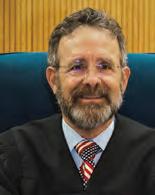
Nadine Graves ’17 received the Recent Alumni Award.
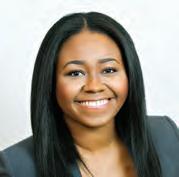
Graves joined the Legal Rights Center last year after several years as a defense attorney and public defender in Hennepin County, Minnesota.
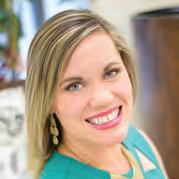
The daughter of Liberian immigrants, Graves was born and raised in Minnesota and is a voice for racial equity and justice reform. She has testified in support of policies including “Ban the Box” and expungement reform, and she serves on a state advisory board that reviews legal cases of people believed to be wrongfully convicted.
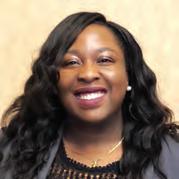

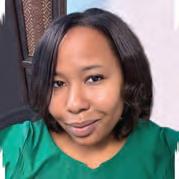

She recently received a Bush Foundation fellowship.
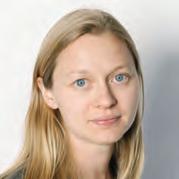
Six new members of Alumni Association board
The Mitchell Hamline Alumni Board added four new members in 2022 and two more in 2023
Nicole Harris ’19 is an assistant county attorney in the trial division in Ramsey County. She also tutors Mitchell Hamline students and alumni studying for the bar exam.
Muteeat Lawal ’19 is an assistant county attorney in juvenile protection in Hennepin County.
Alisha Marie Nair ’10 is a senior attorney for the city of Atlanta’s litigation division and an adjunct/ affiliated professor at Mitchell Hamline.
Sarah Soucie Eyberg ’11 owns Soucie Eyberg Law in Andover, Minnesota, and focuses on Social Security Disability law.
Amber Goodwin ’21 is an assistant district attorney in Travis County, Texas.
Katherine Raths ’22 is clerking for Minnesota Supreme Court Justice Paul Thissen.
MITCHELL
16 ALUMNI
HAMLINE LAW
NEWS
Blanke, Butterfoss, Failinger, and Winer retire from Mitchell Hamline
BY TOM WEBER
Four impor tant leaders in the history of Mitchell Hamline and its predecessor schools retired in the past year. In addition to their important scholarship and teaching abilities, Doug Blanke, Ed Butterfoss, Marie Failinger, and Anthony Winer also held crucial leadership roles. Blanke founded the Public Health Law Center at Mitchell Hamline; Butterfoss and Failinger both served as deans at Hamline Law (they also started at the law school on the same day in 1983); and Winer was a trailblazer for LGBTQ+ people in legal education.
Doug Blanke
After playing a key role in the historic ligation against the tobacco industry in the 1990s, Blanke left the Minnesota attorney general’s office to start what is now the Public Health Law Center at Mitchell Hamline.
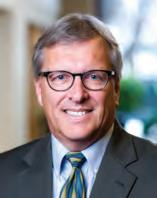
From a one-person think tank on commercial tobacco control issues, the center has grown to become a national organization of several dozen public health attorneys, policy analysts, and support staff that help strengthen public health laws and health equity.
Ed Butterfoss
During nearly 40 years in legal education, Butterfoss was a well-known instructor of contracts, criminal law, and criminal procedure who took on several leadership positions, including several years as Hamline Law’s dean.
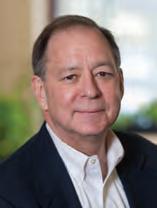
He worked extensively with the Minnesota Minority Lawyers Association to diversify the student body and, during his deanship, began the second weekend law school program in the nation. Said Professor Emeritus Joseph Daly: “When Professor Butterfoss became Dean Butterfoss I learned what true leadership is.”

Marie Failinger
In her nearly 40 years in legal education, Failinger taught constitutional, criminal, family, and property law—to name a few. She was also Hamline Law’s final dean before the 2015 combination with William Mitchell.
She’s been a fierce advocate for women in the law, a de facto Mitchell Hamline historian, and a scholar of religion and the law. She was editor in chief of the Journal of Law and Religion for 24 years.
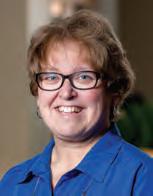
Anthony Winer
Winer left a big law firm in New York City in the late 1980s after watching friends, acquaintances, and his longtime partner die from AIDS. Becoming one of the nation’s few gay law professors would be a chance to both be a positive example for lesbian and gay students and to break stereotypes.
His groundbreaking seminar on sexual orientation and the law, begun in the early 90s, was often one of the most popular courses offered.
FACULTY NEWS 17 MITCHELL HAMLINE LAW Read the full stories of the retiring class of professors in 2023. mitchellhamline.edu/retired23
Professors in the Media FACULTY
Mitchell Hamline faculty are often interviewed for their legal expertise on the news of the day.
Here’s a sample of 2022 media coverage from across the country featuring our faculty:
“Justice Jackson has been able to be the first person with the voice of reason who has represented poor people who couldn’t afford an attorney.” (Strachan) “I think maybe that stigma will go away a little bit now that you can still be a Supreme Court justice having taken that career path.” (Brantley)
DESHAYLA STRACHAN and MAIKIETA BRANTLEY , on the importance of Ketanji Brown Jackson’s confirmation to the U.S. Supreme Court. Apr. 7, KARE11
“There is no question that the FDA has proper authority to regulate the drugs used in medication abortions. The question is whether a state can make a viable, winning argument that, for public health purposes, it needs to further regulate access to the relevant medications.”
LAURA HERMER , on legislators’ efforts nationwide to limit access to abortion medications. May 5, Associated Press


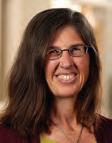
“We’re one decision away from an anything-goes, ‘Wild, Wild West’ way of partisan gerrymandering.”

JASON MARISAM , on the ramifications of the independent state legislature theory being debated before the U.S. Supreme Court. Jun. 22, Bloomberg Government
“I’m concerned for government officials to be deputized in a way that gives them police power—that they will go unchecked and that will fall on people of color and those with indigenous and ethnic backgrounds.”
T. ANANSI WILSON , on a case that questions whether all government officials, not just police, can be shielded from litigation for acts such as detaining citizens. Jul. 19, Star Tribune
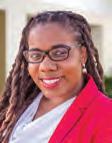
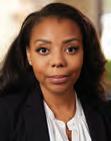
“He has no more right to represent the state of Minnesota [in its] entirety than I do. He doesn’t have any statewide authority to do that. He has the authority granted to him in the county where he was elected.”
BRAD COLBERT ’85 on a Minnesota county attorney’s (ultimately unsuccessful) attempt to intervene in a high-profile abortion case after the attorney general declined to appeal a ruling. Aug. 19, MPR News


“Brain death is a legal designation in all 50 states. How brain death is determined, which tests are used, and the type of physician qualified to make the determination can vary by state.”

THADDEUS MASON POPE , on the changing legal landscape of medical practices around death. Dec. 11. Wall Street Journal
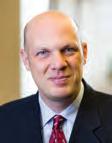


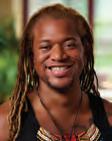
MITCHELL HAMLINE LAW 18
NEWS
Mitchell Hamline welcomed five new faculty members in 2022
Associate Professor of Law Kim VuDinh joined Mitchell Hamline from the William H. Bowen School of Law at the University of Arkansas at Little Rock. Last fall, she debuted one of Mitchell Hamline’s newest clinics, the Economic Inclusion Clinic, which is a continuation of work she did in Arkansas (see page 6 –Celebrating Legacy story).
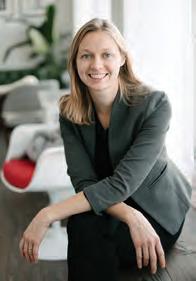
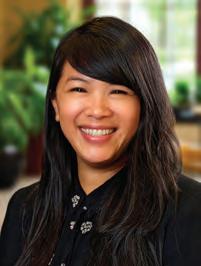
Associate Professor of Law Jason Marisam previously taught at Hamline University School of Law before clerking for U.S. District Court Judge Joan Ericksen, then joining the Minnesota Attorney General’s Office. In December, the authors of three briefs in an important election-related Supreme Court case cited Marisam’s forthcoming
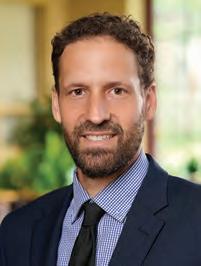
law review article about the focus of the case, the independent state legislature theory.
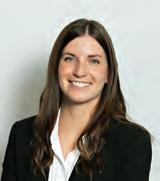
Assistant Professor of Law Jared Mollenkof joined Mitchell Hamline from Hennepin County, where he’d been a public defender since 2019. He was also a public defender in Nashville. In February, Mollenkof’s article on the newest Hennepin County Attorney was published in Inquest, a forum published by the Institute to End Mass Incarceration at Harvard Law School.
Assistant Professor of Law Forrest Tahdooahnippah (Comanche Nation), was a partner at Dorsey & Whitney in Minneapolis before joining Mitchell Hamline. He has worked on matters




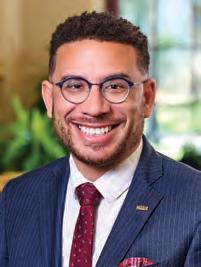
related to Native American law, intellectual property, and religious freedom. He has also served as the elected tribal attorney for the Comanche Nation of Oklahoma.
Visiting Assistant Professor Octavia Carson is a U.S. Navy veteran with a background in journalism who graduated first in their class at Thomas Jefferson School of Law. Carson founded and runs a nonprofit organization that supports Black bar exam applicants, which is part of their extensive work nationally to reform the bar exam and increase diversity in the legal profession.
Six receive Student Award of Merit

Six students were named Student Award of Merit recipients over the past two years. The award, from the Mitchell Hamline Alumni Association, honors graduating students whose contributions and participation in organizations and other events go beyond the normal expectations for a student, and who exhibit a strong commitment to diversity, equity, and inclusion.
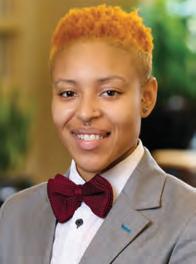
FACULTY NEWS 19 MITCHELL HAMLINE LAW
Kim Vu-Dinh
Jason Marisam
Jared Mollenkof
Forrest Tahdooahnippah Octavia Carson
Angela Levasseur ’22 Nisichawayasihk Cree Nation, Canada.
Katherine Raths ’22 Minneapolis, Minn.
Marilys Solano ’23 Miami, Fla.
Jayashree Venkateswaran ’23 Corcoran, Minn.
Kaitlin Yira ’22 Minneapolis, Minn.
Michelle Furrer ’23 Monroe, Wash.
STUDENTS
National Jurist magazine named student Nicole van Lierop ’22 one of ten Law Students of the Year in March 2022. Van Lierop attended law school while also being a frontline nurse in the early days of the COVID pandemic.


Student Anthony Walsh ’23 wrote a children’s book “Hockey is for Everyone,” aimed at making hockey more inclusive. The book is informed from Walsh’s own experiences playing competitive hockey.
Student Hannah Burton ’23 won an Outstanding Clinical Student award from the Clinical Legal Education Association in Spring 2022 for her work in Mitchell Hamline’s Child Protection Clinic
Student Kiana Carlson (Ahtna Kohtaene,Taltsiine; Native Village of Cantwell, Alaska) was named one of 17 members of the U.S. Department of Interior’s Advisory Committee on Reconciliation in Place Names.



Two months after graduating, Angela LeVasseur ’22 was elected the first female chief of the Nisichawayasihk Cree Nation in Canada.
A federal court in August ruled for Tribes in Wisconsin in a case that several Mitchell Hamline students had worked on various aspects of over several years.
FACULTY
Professor T. Anansi Wilson was inducted into the Martin Luther King, Jr. Collegium of Scholars at Morehouse College.


Professor Brad Colbert ’85 won the Minnesota Justice Foundation’s Legal Services award for his years of work to increase access to justice for people impacted by incarceration.

Professor Angelique EagleWoman was sworn in as chief justice of the Sisseton-Wahpeton Supreme Court of Appeals.
SCHOOL
Nicole James Gilchrist ’03 was named chair of the Mitchell Hamline Board of Trustees
Joelle Lester was named executive director of the Public Health Law Center at Mitchell Hamline in December, succeeding founding director Doug Blanke


We’d like to know if you prefer to receive this magazine in print or digital form. Use the QR code to let us know.
Register to play at mitchellhamline.edu/golf.

There’s no need to only hear from us once a year. Sign up for The Brief. This monthly newsletter, delivered to your inbox, will keep you updated on the latest news from Mitchell Hamline, along with CLE and other events and opportunities coming up. Head to mitchellhamline.edu/alumni and sign up for The Brief.

MITCHELL HAMLINE LAW 20
MITCHELL HAMLINE NEWS
1975
JOHN P. SMITH received Concordia College Moorhead’s alumni achievement award in 2022.
1977
MATTHEW J. OPAT retired from Minnesota’s 3rd Judicial District Court bench.
1978
SCOTT M. BORENE was recognized as the 2022 Minneapolis Lawyer of the Year in Immigration Law by Best Lawyers in America.
THOMAS V. SJOBLOM joined Carlton Fields as shareholder in the firm’s Washington, D.C., office

1979
JAMES H. GARRECHT retired as a judge in Routt County, Colorado, after 34 years.

VICTORIA N. NEWCOME JOHNSON stepped down from her position as ombudsperson for clerical sexual abuse within the Archdiocese of Saint Paul and Minneapolis.
1981
PAUL DOUGLAS MCKEEN was appointed senior vice president of labor relations at Atlas Air.


DAVID A. ODAHOWSKI was named the Lydia Gardner Winter Park (Fla.) Chamber Citizen of the Year.
MANSCO PERRY was appointed to Oaktree Capital Group’s board of directors.
PETER M. ROSENE was named the 2023 Minneapolis Regional Lawyer of the Year for Employee Benefits Law by Best Lawyers in America.
1982
KENNETH J. ABDO was featured on Billboard Magazine’s Top Music Lawyers list for the fifth consecutive year.
1983
THOMAS F. CARRETTA retired as deputy general counsel and vice president of legal at FICO. He practiced for over 38 years.
JODI WILLIAMSON retired from Minnesota’s 3rd Judicial District Court bench, after 20-plus years.

AUDREY A. ZIBELMAN was named a vice president and then advisor of X, the moonshot factory.
1984
MARY SUSAN BURNS was named among the Top 200 Global Cannabis Lawyers by the Cannabis Law Report.


THOMAS J. CHRISTENSON was appointed to serve as a judge on Minnesota's Workers’ Compensation Court of Appeals.
1985
BRIAN H. BATZLI was named president of the American Intellectual Property Law Association.

LESLIE KIMES retired after 36 years of practice. Prior to opening her own family law practice, she worked for a small general practice firm in St. Paul.
PATRICIA J. MILUN was reappointed as a judge on the Minnesota Workers’ Compensation Court of Appeals for another six-year term.

ANDREW M. TATARYN joined Maslon as a corporate and securities attorney.
1986
JANET S. STELLPFLUG received national certification as a Women’s Business Enterprise by the Women's Business Development Center-Midwest. Her firm, Stellpflug Law, is 100% women owned.

1987
JAMES P. CAREY received the 2022 Alumni Achievement Award from St. John’s University (Minn).

1988
CAROL S. GIULIANI was named on the 2022 AARP Minnesota and Pollen 50 Over 50 list.
KRISTINA J. RASMUSSEN received the 2022 Lifetime Achievement Pro Bono Award from the Dane County (Wis.) Bar Association.

1989
KARIN L. SONNEMAN was elected to her fourth term as Winona County (Minn.) Attorney.
1990
ROBERT A. MATHERS joined Quarles & Brady's Milwaukee office as business and tax law partner.


MRG SIMON began a business in the Sioux Falls (S.D.) area focused on helping lawyers reduce stress and improve productivity through organization of their physical space.
1991
MICHAEL J. BROSE was appointed to the Judicial Selection Advisory Committee by Wisconsin Governor Tony Evers.
MICHAEL P. CARLSON joined Trustmark National Bank as executive vice president and chief risk officer.
ROBIN J. DOROSHOW wrote her first book, “Aberdeen: A Jewish History—105 Years of Congregation B’nai Isaac and the Community it Brought Together”.
FRANK M. MILEY was appointed trustee at Otto Bremer Trust.
PATRICK J. PETERS was named administrator for the Jackson County Regional Health Center in Maquoketa, Iowa.
MARIA C. CHRISTU joined Latitude as the director of legal recruiting and placement.
ALAN CLEMMONS was appointed judge of the Equity Court in Horry County, S.C.

CAROLINE H. LENNON was named chief judge of Minnesota’s 1st Judicial District.
SOREN P. PETREK announced his Madeleine Toche book series would be released as audiobooks in French by SAGA Egmont Publishing.
1992
TERRY A. COFFING joined FaceTec as chief legal officer.


ROBIN L. MAYNARD was appointed to the Harding University (Ark.) board of trustees.

21 MITCHELL HAMLINE LAW
CLASS NOTES
ANNE MCKEIG was elected to the American Law Institute.

GREGORY J. REIGEL was elected president of the Lawyer-Pilots Bar Association.

VICTORIA L. SELTUN joined von Briesen & Roper as a shareholder.

1995
CHRISTINA J. CHING founded Rise and Make Waves, a coaching organization that helps women lawyers step up, speak up, and take action in their lives and careers. She's also a public speaker and inclusion advocate for the AAPI community.

MARK A. OSTREM was elected to his fifth term as Olmstead County (Minn.) Attorney.
CHERYL A. STANTON was named general counsel and corporate secretary at the College of Saint Benedict and Saint John’s University (Minn.).
1998
SUSAN H. STEPHAN was named director of the online Master of Legal Studies Program at the University of Cincinnati College of Law.
1993
MITCHEL C. CHARGO joined Hinshaw & Culbertson’s commercial transactions practice group as a partner.
SUSAN M. GALLAGHER was awarded the 2022 John D. Levine Distinguished Service Award by the Hennepin County Volunteer Lawyers Network.
LAURA A. WESTBYL was appointed to MustGrow’s board of directors.
1994
THOMAS F. KELLE opened The Audio Bakery, an audiobook production facility.
DAMON E. SCHRAMM was appointed to Canterbury Park’s board of directors.

DELINDA V. WASHINGTON was named a 2022 Top Diversity Leader in Healthcare by Modern Healthcare.
CHARLES H. OLIVER III was appointed civil traffic hearing officer in the 17th Judicial Circuit of Florida.
KAREN D. OLSON was elected partner at Spencer Fane.



STEVEN L. SCHLEICHER was admitted to the American College of Trial Lawyers. He also joined the International Association of Defense Counsel.
ANNE MARIE SOLBERG was promoted to senior associate general counsel at The Opus Group.
1996
MATTHEW S. LUXTON was named senior vice president and general counsel of Cubic.


BRIAN T. MAK was promoted to director of the Workers’ Compensation Alternative Dispute Resolution Unit at the Minn. Department of Labor and Industry.
JOMARIE L. MORRIS was named executive director of the Coalition for Rochester Area Housing.
CHARLES D. SLANE was elected president of the Minnesota Association for Justice.
1997
TAMIKA R. NEWSON was named vice president and named head of global litigation at Energizer.
HEIDI A. CARPENTER was named chief executive officer of Fafinski Mark & Johnson.
LAURA K. GRAF was named a 2022 Women in Business honoree by the Minneapolis/St. Paul Business Journal.
TIMOTHY L. GUSTIN was elected to the board of directors at Moss & Barnett. He serves as chair of the board and as chair of the firm’s Real Estate Finance and Real Estate Practice Groups.
JEFFREY M. MONTPETIT was named a Top 100 Trial Lawyer in the state of Minnesota by National Trial Lawyers.
AMY E. PALMER-ELLIS joined the Vermont Attorney General’s office as an assistant attorney in the general counsel and administrative law division.
KELLY F. SOFION was named shareholder at Lommen Abdo.
DANIELLE M. SHELTON WALCZAK was named executive director of MidMinnesota Legal Aid.


1999
TRENT L. BUSH was appointed to the Illinois Supreme Court e-Business Policy Advisory Board.
DEBRA A. GROEHLER was appointed to Minnesota’s 3rd Judicial District Court bench.
GILLIAN U. ROSENQUIST was re-elected to the Golden Valley (Minn.) City Council.
GRETA M. SMOLNISKY was appointed to Minnesota’s 7th Judicial District Court bench.
2000
DAVID E. CAMAROTTO opened the firm Bradford, Andresen, Norrie & Camarotto.

DAVID W. LAW was named superintendent of the Minnetonka Public School District (Minn.) and was elected to the American Association of School Administrators’ executive committee.


HILARY D. MARDEN-RESNIK was named president and chief executive officer of UCare.

KIMBERLY A. SMALL was named executive director of the Illinois Association of School Boards.
KARI J. THURLOW was named president and chief executive officer of LeadingAge Minnesota.
SARA N. WILSON was elected to Lommen Abdo’s board of directors.
2001
LAURIE W. HUOTARI was named office managing partner at Stoel Rives.
CHRISTOPHER A. JOHNSTON opened the Law Museum of Iowa in Windsor Heights, Iowa, only the second known law museum in the U.S. and fourth in the world.
MITCHELL HAMLINE LAW 24 CLASS NOTES
JESSICA S. KUCHTA-MILLER was named the first universitywide ombudsperson at Duke University.
JEFFREY S. SIEBEN was named a Top 100 Trial Lawyer in Minnesota by National Trial Lawyers.
LISA T. SPENCER was named a “North Star Lawyer” by the Minnesota State Bar Association for her pro bono work.
ANTHONY S. WACHEWICZ was appointed city attorney of De Pere, Wis.
2002
JEREMY L. CLINEFELTER was appointed to Minnesota’s 3rd Judicial District Court bench.
JENNIFER D. HENDERSON named vice president, general counsel and corporate secretary at Ceres Global Ag Corp.
BROOK R. MALLAK Minnesota Mutual Lawyers Insurance Company as a claims attorney.
JERRY A. MCDONALD was re-elected to the Chanhassen (Minn.) City Council.
JERI L. PARKIN was elected shareholder at Fredrikson & Byron.



2003
TAMMERA R. DIEHM was named a “North Star Lawyer” by the Minnesota State Bar Association for her pro bono work.



JEREMY P. GREENHOUSE joined Fredrikson & Byron as a shareholder.

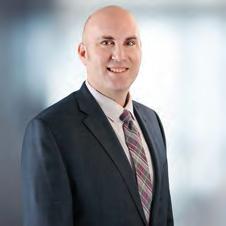



KYLE R. GUSTAFSON was appointed executive director of the Minnesota Racing Commission.
CAMERON R. KELLY was elected to Lommen Abdo’s board of directors.

2005
SHANE BARNES joined Faegre Drinker as counsel in the real estate practice group.


KRISTIN L. KINGSBURY joined Bassford Remele as shareholder.
RUTH A. RICHARDSON was named chief executive officer of Planned Parenthood North Central States.
DENNIS M. SCANLON was named deputy commissioner of the North American Hockey League.
ERIN E. MATHERN was elected to Winthrop & Weinstine’s board of directors.
2004
PATRICIA L. ASSMANN was awarded real estate board certification status by the Florida Bar.

DAVID M. BONELLI joined Venable as a partner in the autonomous and connected mobility group.
HUSNIYAH L. DENT BRADLEY was appointed an alternate to the MN Transportation Advisory Board by the Metropolitan Council.


MICHAEL T. ETMUND was named shareholder at Moss & Barnett.

CHRISTY M. HORMANN was appointed to Minnesota’s 3rd Judicial District Court bench.
HEIDI J. NAU joined Fox Rothschild as counsel in the Real Estate Department.
KARI L. WILLIS was appointed to Minnesota’s 10th Judicial District Court bench.
BRITTANY J. MAYER-SCHULER was named president of Elior North America’s Corrections segment.


MARY FRANCES M. PRICE was named shareholder at Moss & Barnett.
CARISSA K. SEIDL opened her own law office in Tennessee and Arizona that focuses on family law.

KRISTI D. STANISLAWSKI was appointed to Minnesota’s 10th Judicial District Court bench.
MEGHAN T. STILING was named chief digital and operating officer at Nerdery.
2006
CONNIE I. ARMSTRONG received the 2022 Top Women in Construction: Professional Services award from Finance & Commerce.
KATHERINE M. CANADEO was named partner at McCarty Law.

JESSE A. FLYNN joined Woods, Fuller, Shultz, and Smith.
DEANNE M. KOLL was elected chair of the Wisconsin chapter of the International Women’s Insolvency and Restructuring Confederation.
STACEY E. SORENSEN was appointed to Minnesota’s 1st Judicial District Court bench.
SARAH J. WENTZ was selected to Hollywood Reporter’s list of the top 35 lawyers handling some of the most challenging matters on behalf of Hollywood’s elite.
2007
NJ AYUK was named one of the 100 Most Reputable Africans of 2023 by Reputation Poll International.
LOREN L. HANSEN was appointed leader of Lathrop GPM’s Intellectual Property Litigation Practice Group.
MELISSA J. HOUGHTALING was appointed to Minnesota’s 4th Judicial District Court bench.
SUSAN J. MARKEY was appointed to serve as co-chair of the Corporate & Securities Practice Group at Maslon.
DOERING S. MEYER was appointed consul for the U.S. Embassy and began her tour as a career diplomat in N’Djamena, Chad.
KEVIN A. SIEBEN was elected as a fellow of the American Bar Foundation.



23 MITCHELL HAMLINE LAW CLASS NOTES
KRISTINE A. WEEKS was appointed to Minnesota’s 5th Judicial District Court bench.

JEFFREY A. WIELAND was named shareholder at Moss & Barnett.

2008
SARAH B. BENNETT joined Fredrikson & Byron as an officer in the Real Estate, Corporate & Securities, Bank & Finance and Mergers & Acquisitions Groups.
JANE BOWMAN, chief judge of the Minnesota Tax Court, was reappointed to the court for a six-year term.
KIMBERLY E. BRZEZINSKI was named shareholder at Hanft Fride.
J.D. BURTON was named vice chancellor for government relations at Washington University in St. Louis.
CHRISTINE L. EID joined Vantage Law Group as a partner.
JUANITA FREEMAN was named a 2022 Diversity and Inclusion Awards honoree by Minnesota Lawyer.
KATHRYN IVERSON LANDRUM was appointed to Minnesota’s 1st Judicial District Court bench.
RICK N. LINSK became an assistant attorney general in the charities division of the Office of Minnesota Attorney General Keith Ellison.
NICHOLAS B. NELSON was named chief operating officer at Barr Engineering.
BRADLEY A. PEDERSON was named a 2022 Diversity and Inclusion Awards honoree by Minnesota Lawyer.
MATTHEW D. RESCH joined Maslon in corporate & securities.


2009
MARA N. ASCHEMAN was named regional vice president of rates and regulatory affairs at Xcel Energy.
TIMOTHY P. CAREY was appointed to Minnesota’s 2nd Judicial District Court bench.
PATRICK J. GARAY-HEELAN was named board chair of The Ordway Center for the Performing Arts.
SUSAN A. KING was appointed adjunct director to Moss & Barnett’s board of directors.
CHRISTOPHER T. KOEHNKE was promoted to shareholder at von Briesen & Roper.
ANGELA V. LALLEMONT was named a fellow of the American Academy of Matrimonial Lawyers and achieved board certification as a Family Trial Law Advocate by the National Board of Trial Advocacy.
NATALIE S. MARTINEZ was appointed to Minnesota’s 3rd Judicial District Court bench.


ADINE S. MOMOH joined the United States Attorney’s Office in Minnesota as an assistant United States attorney and federal prosecutor.

TARA L. SMITH launched Smith Family Law.
DRAEKE H. WESEMAN was named of counsel at Greenberg Traurig.

BENJAMIN R. WILCOX was appointed to Minnesota’s 8th Judicial District Court bench.
2010
JESSICA K. DENNIS was named partner at Meagher + Geer. She practices anti-fraud counseling and litigation.





WENDY S. JOHNSON was appointed court commissioner in Eau Claire County, Wis.
JESSICA M. KENNEDY was named president of a new health division at the world’s largest Deaf-led social impact organization, Communication Service for the Deaf.

LAUREN E. NUFFORT was elected to Lommen Abdo's board of directors.

KRISTA J. PEZEWSKI was elected as an equity shareholder at Haws-KM.
GRETA B. REYES was elected partner at Stinson.
2011
WILLIAM B. MAGUIRE joined the California Department of Public Health, where he works to support COVID-19 testing and immunizations programs.
JOHN D. SCHROEDER was named Volunteer of the Year by the Wisconsin Potato & Vegetable Growers Association.
GREGORY S. SCHWARTZ was named a 2022 Diversity and Inclusion Awards honoree by Minnesota Lawyer.
LINDSAY L. SIOLKA was appointed chief public defender in Minnesota’s 1st Judicial District.
2012
ZEB M. ANDERSON founded LegalQ, a free smartphone app that connects people with lawyers.
BRADLEY R. ARMSTRONG was named shareholder at Moss & Barnett.
JOSEPH A. CAMILLI joined von Briesen & Roper as a shareholder.

MARK A. SCHULZ joined LeadingAge Minnesota as vice president of policy and regulatory affairs.
JOSEPH M. SIMMER joined Lommen Abdo's litigation team.
SAMUEL S. STALSBERG was named shareholder at Winthrop & Weinstine.
JESSICA R. CARLSON joined Faegre Drinker as counsel in the finance & restructuring practice.

KEVIN G. CRANE was named a Credit Union Rockstar by the Credit Union National Association.
ANN L. GEMMELL was named one of the 2022 Notable Women in Law by Twin Cities Business.
X. CHRISTINA HUANG was named partner at Faegre Drinker.


MITCHELL HAMLINE LAW 24
CLASS NOTES
JOHN P. KENNEDY was named a shareholder at Moss & Barnett.
BRENT D. KETTELKAMP was promoted to shareholder at Ogletree Deakins.
ASHLEIGH E. RASO started the firm Nigh Goldenberg Raso & Vaughn.


ERIK L. ROMSAAS was named a shareholder at Moss & Barnett.

ERICA A. HOLZER was appointed to serve as reporter for the Minnesota Supreme Court Advisory Committee on the Rules of Civil Procedure.


JESSICA L. TIMMINGTON
LINDSTROM was named to the “North Star Lawyers” list by the Minnesota State Bar Association for her pro bono work. She was also promoted to managing associate at Winthrop & Weinstine.
ANISHA J. MURPHY was named a 2022 Women in Business honoree by the Minneapolis/St. Paul Business Journal.
MATTHEW C. STINSON was elected county attorney in Wabasha County, Minn.

2015
KARA K. GRAY was elected partner at Lathrop GPM


2017
AVA MARIE CAVACO joined Nigh Goldenberg Raso & Vaughn.
JACOB M. GLASS joined Enbridge Energy as in-house counsel.
DAVID H. STERN was named to Law360’s 2022 Bankruptcy Editorial Advisory Board.
JOHN M. SCHMID joined Moss & Barnett.
2014
ALLISON M. SEELEY joined Faegre Drinker's finance & restructuring practice.
RYAN D. SHARP was named of counsel at Greenberg Traurig.

CHRISTINA M. ZAUHAR was named partner at Halberg Criminal Defense.
2013
WADE C. ADAMSON joined Winthrop & Weinstine in the Real Estate Development & Transactions practice.

MARIA N. DE LA CRUZ was named vice president and chief external affairs officer at the National Committee for Responsive Philanthropy.

MARLENE J. GOLDENBERG started the firm Nigh Goldenberg Raso & Vaughn.
AYAH N. HELMY was named a 2022 Diversity and Inclusion Awards honoree by Minnesota Lawyer.
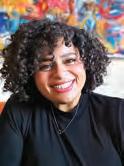
LORI SAROYA became the first Muslim and woman of color elected to the Blaine (Minn.) City Council.

JEVON C. BINDMAN was named to the Minnesota Supreme Court Advisory Committee on the Rules of Civil Procedure. He was also elected partner at Maslon.
ARAM V. DESTEIAN was elected shareholder at Bassford Remele.
KAITLIN J. EISLER was elected partner at Maslon.

LESLIE D. FUNK joined Google’s diversity, equity, and inclusion team as community manager for employee resource groups.
BETH L. LACANNE joined Bassford Remele.
BETH SCHROEDER HARPER was named to the “North Star Lawyers” list by the Minnesota State Bar Association for her pro bono work.
CHELSY M. JANTSCH was named shareholder at Moss & Barnett.
PETER D. KIESELBACH was named shareholder at Greenberg Traurig.
MOLLY E. NEPHEW joined Seyfarth Shaw.
AARON D. QUINBY joined Moss & Barnett.
AMY B. WEISGRAM was sworn in as a conciliation court referee for the PICK counties (Minn.).
2018
WILLIAM B. CULP opened Culp Law Office in Mahomet, Ill.
CASSANDRA M. JACOBSEN helped draft a U.S. Supreme Court amicus curiae brief on behalf of the National Council of American Indians in the voting rights case Merrill v. Milligan

MATTHEW A. JANZEN joined Meagher + Geer.

BRIAN KENNEDY was elected to the city council in El Paso, Texas.
RACHEL E. MAES won a Future 15 award and was a finalist for Young Professional of the Year by the Greater Green Bay Chamber of Commerce.
MEG M. MARTIN joined the wealth management division of Bell Bank as vice president and senior wealth & fiduciary advisor.
VERONICA M. MASON was named partner at Faegre Drinker.
NATHAN R. SNYDER was elected chair of the Minnesota State Bar Association’s Sports, Art, and Entertainment Law Section.
2016
RAHA ASSADI-LAMOUKI was named shareholder at Winthrop and Weinstine.
GULED A. IBRAHIM was named a 2022 Diversity and Inclusion Awards honoree by Minnesota Lawyer.

SARAH M. LOVEGREEN was named to the “North Star Lawyers” list by the Minnesota State Bar Association for her pro bono work.
ROGER J. REINERT was promoted to commander in the United States Navy.
KATIE G. SPEAR was reappointed to the Florida Board of Optometry.
DAVID M. TANABE was selected for the 2022 Blackshear American College of Bankruptcy Presidential Fellowship by the National Conference of Bankruptcy Judges.

25 MITCHELL HAMLINE LAW
CLASS NOTES
MATTHEW YOST joined Messick Law as an associate attorney practicing family law.



2019
SARAH J.M. COX was named to the board of directors at Justice360.
2020
JACQUELINE M. PRIMEAU was named assistant county attorney in St. Louis County, Minn.
ERINN B. VALINE joined Fabyanske, Westra, Hart & Thomson.
AARON C. RICE was named chair of Founders Legal’s Entertainment Group and managing attorney of the firm’s Nashville location.
J. REX TOLLIVER was named vice president for student affairs and academic support at the University of South Carolina.


SAMANTHA C. ZUEHLKE joined Kennedy & Graven, Chartered.
2021
RYAN COX joined Fredrikson & Byron’s energy and natural resources, energy regulation and permitting, and commercial law groups.
Minnesota Legislature
Twelve Mitchell Hamline alums were elected or re-elected to the Minnesota Legislature in the 2022 election—six each in the House and Senate:
REPRESENTATIVES
Jamie Becker-Finn ’11
Sandra Feist ’07
Cedrick Frazer ’07
Mike Freiberg ’05
Kelly Moller ’98
Ruth Richardson ’06
SENATORS
Bobby Joe Champion ’95
Nick Frentz ’87
Jen McEwen ’09
Bonnie Westlin ’95
Torrey Westrom ’03
Tou Xiong ’15
Attorneys of the Year
Several members of the Mitchell Hamline community were recognized by Minnesota Lawyer as 2022 Attorneys of the Year. In all, 23 Mitchell Hamline alums, along with one former trustee and a former Distinguished Practitioner in Residence, made the list. They account for a quarter of the 100 attorneys who were honored this year.
Michael Collyard ’00
Robert Correia ’15
Celeste Culberth ’92
Aaron Dean ’94
Holly Dolejsi ’09
Clifford Greene, former distinguished practitioner in residence
Rochelle Hauser ’07
Theresa Hughes ’85
John Keller ’96
Grace Kim ’13
ANDREA J. BAPST joined the Foran Glennon's London office.
JUSTIN S. BOSCHWITZ joined Moss & Barnett.
ARIANNA CHAPMAN joined Arthur, Chapman, Kettering, Smetak & Pikala.

CARA DIMARE was named managing attorney for the Fort Yates Office of Dakota Plains Legal Services, which provides free legal services for eligible individuals on the Standing Rock Reservation and surrounding areas.
LYNSEY R. ROSS LUND joined the United States Attorney’s Office for the District of Montana.
KIRSTYN L. OYE was named assistant county attorney in St. Louis County, Minn.
SAMANTHA EMRO joined von Briesen & Roper.

NIKKI KNISLEY was named editor for the Newsleaders of Sartell-St. Stephen and St. Joseph (Minn.).



MADELEINE F. PEAKE joined Moss & Barnett.
2022
NICHOLAS E. CAREY joined SiebenCarey.
ANGELA LEVASSEUR became the first woman to be elected chief of the Nisichawayasihk Cree Nation in Canada.

Sens. Melisa López Franzen ’06, Scott Newman ’73, and Chuck Wiger ’77, as well as Rep. Nels Pierson III ’12, departed the Legislature last year. Thank you for your public service!
Judicial Commission
Ten Mitchell Hamline alums were appointed or reappointed to Minnesota’s Commission on Judicial Selection. The commission recommends judicial candidates to Minnesota's governor.
Erin Sindberg Porter ’07 was reappointed commission chair
Eric Beyer ’98
Kenya Bodden ’01
Richard Gorman ’89
Lynn Johnson ’96
Sarah L. Klaassen ’05
Beth L. Lacanne ’14
Daniel Lew ’95
Joshua Tuchscherer ’00
Angela Brandt ’99
In addition, Mitchell Hamline Diversity, Equity, and Inclusion Director Sharon Van Leer was also reappointed.

Mathew Korte ’06
Katie Crosby Lehmann ’95
Leslie Lienemann ’92
Benjamen C. Linden ’12
Michelle Looby ’07
Carly Melin ’10
Adine Momoh ’09
Teresa J. Nelson ’96
Megan Odom ’17
Clark D. Opdahl ’86
Tim Purdon ’94
Lewis Remele, Jr., former trustee
Richard Ruohonen ’96
Jennifer A. Thompson ’03
Sharon Van Dyck ’87
MITCHELL HAMLINE LAW 22 CLASS NOTES
Hillstrom estate gift creates Mitchell Hamline’s largest endowed scholarship
BY ALLISON BURKE
Robert (Bob) Hillstrom ’70 didn’t just find a job to help pay for college. He started a landscaping business that helped pay for his growing family. He married his wife, Patricia, at age 18; three of their five children were born during his time as an undergraduate.
After time as a teacher and real estate agent, Hillstrom enrolled as a law student at William Mitchell at age 32. Once again, he needed to work during school—this time as an appraiser—and he still finished first in his class. He later noted he was able to juggle studies, work and life at home with the help of his wife, family, friends, and mentors.
The relationships Bob built during law school enriched his life both professionally and personally. He maintained a strong network of business contacts from Mitchell, bravely calling on attorneys with impressive reputations when others might have been intimidated—but Bob wasn’t scared to call on the right expert for the problem at hand. Patricia and he had a lifelong friendship with Judge Ronald Hachey ’43 and his wife, Alverna. Hillstrom once said in an interview that his days at William Mitchell “were a great joy, and the friendships I made were golden.”
Hillstrom, who died in November 2020, made a transformative $1.873 million gift to Mitchell Hamline in his estate plan, creating the largest endowed scholarship at the law school.
The Robert A. and Patricia L. Hillstrom Scholarship will provide full tuition scholarships to one or more top students at the end of their first or second year. The Hillstrom scholarship is the only fund designed to provide at least one student full tuition. During his own law school studies, Hillstrom also received a scholarship. It was the only financial aid he ever had during his entire education. Hillstrom chose to provide the kind of support of which he received so little—the financial support to focus on academic successes and maximize the law school experience. His hope, he once said, was that the scholarship “enables some students to have a career as satisfying as mine.”
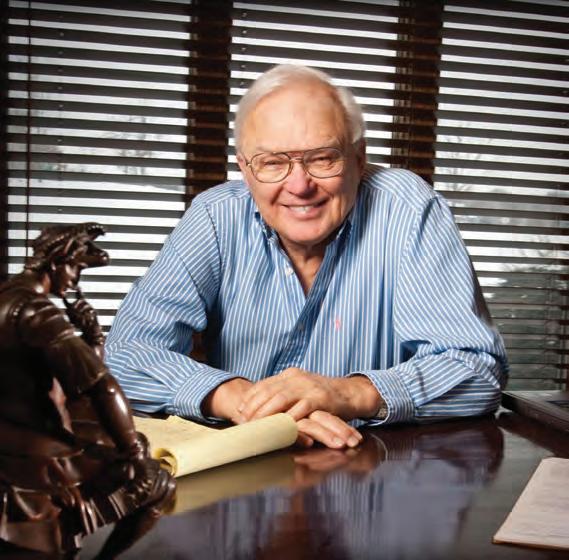
27 MITCHELL HAMLINE LAW
IN MEMORIAM
1956
ALBERT B. YNGVE, 92, died July 10, 2021. Survived by his daughter, Jill (Scott) Yngve Nadeau; and many close family and friends.
1958
ROBERT “BOB” O. VIDAS, 94, died Aug. 29, 2022. Survived by his wife, Donna Fernstrom; children Susan (Dave) Fish and Scott (Brigitte); and many grandchildren, nieces, and nephews.
1959
PAUL A. JOYCE, 90, died Aug. 21, 2022. Survived by his children, Anne, Peter (Sue) Joyce, John Joyce, and Paul (Becky) Joyce; and many grandchildren, nieces, and nephews.
LEE R. LARKIN, 94, died Sept. 28, 2022. Survived by his wife, Jane; son Jim (Penny); granddaughter Amelia; brother Carl (June); brother-in-law John (Patti) Langston; and numerous nieces, nephews, and grand nieces and nephews.

Laura Childress, student
First-year student Laura Childress died suddenly in January, 2023. She came to Mitchell Hamline as a blendedlearning student from New Mexico, where she’d worked as a broadcast journalist, a detention and adult probation officer, and a candidate for political office (in 2020).
She was the first in her family to graduate from high school and college, and to attend law school. Her sons followed in her footsteps to college; they also work in criminal justice.
Her husband said law school was a lifelong dream fulfilled. In one of her final social media posts, Childress wrote “I love my school! MHSL I appreciate the staff, love seeing colleagues and learning from some of THE finest law professors! I’m truly blessed I get to do this!!”

ROBERT “BOB”
A. POWERS, 99, died Feb. 24, 2023.
Survived by his children, Tom (Diane), Pam Keeler, Norah (Chris) Gondeck, and William (Megan); eight grandchildren, a great-grandson; and his brother Daniel (Toni).
1960
LEONARD A. NELSON, 91, died Dec. 5, 2022. Survived by his wife, Grace (Fransen) Nelson; children Ann (Ben) Nelson Moulton, Bradley (Katie) Nelson, and Heidi (Grant) Nelson Young; and nine grandchildren.
1961
G. ROGER COOK, 91, died Dec. 11, 2022. Survived by his wife, Janet; children Michele, Catherine, Stephen, Daniel, and Christopher; and eight grandchildren.
DOUGLAS HEIDENREICH, 90, died Jan. 4, 2023. See inside back cover.
1963
DONALD “DON” W. HASSENSTAB, 89, died April 11, 2022. Survived by his wife, Betty; children Mark (Laurie), Erik (Denise), Paul (Jennifer); and Ann (Steve) Challeen; and many grandchildren and great-grandchildren.
JOHN M. SANDS, 85, died Nov. 26, 2021. Survived by his wife, Janet; children Mark, Jason, and Joseph (Ellen Weld); brother Gerald (Patricia); and three grandchildren.
1964
ROGER H. SCHERER, 84, died Aug. 14, 2022. Survived by his wife, Irma; children Rachael (Stephen Imholte), Peter (Geri), Kristopher (Georganne), Mark (Heather), Andrea (Bryan) Belton, and Maria (Collin Smyser); siblings Gary (Carolyn), Donna Zitur, and Jean (Paul) Wagener; sister-in-law Marina Gentilini; and many grandchildren, great-grandchildren, nieces, nephews, and cousins.
1965
ROBERT “BOB” S. BURK, 85, died Oct. 8, 2022. A former 17-year William Mitchell trustee and an alumni award recipient, Burke is survived by his wife, Eunice Burk; children Bryan (Sue) Burk, Pam (Doug) Anderson, and Matthew (Gretchen) Burk; sister Janice (Bruce) Waller; brother-in-law Orlin Silverman; and six grandchildren.

LAWRENCE
“LARRY” R. COMMERS, 85, died Feb. 10, 2022. Survived by his wife, Tessie; brother Frank (Sandy); sister-in-law Judy Daleki, children Mark (Carole), Kevin (Ann), Sara (Bob) Miles, and Alice (Jim) Grassman; and eight grandchildren.
1966
WILLIAM B. HENSCHEL, 90, Nov. 19, 2022. Survived by his children, Peter (Belinda), Ben, Susan (Gentaro), and Kurt (Lynn); and eight grandchildren.






MITCHELL HAMLINE LAW 28 IN MEMORIAM
1967
ELLEN DRESSELHUIS, 83, died Sept. 11, 2022. Survived by her brother, Gerrit (Julie); many nieces, nephews, and cousins; and dear friends Susan Lauer and Barbara Bartholomew.

ROBERT “BOB” J. GOGGINS, 85, died March 20, 2022. Survived by his wife, Joan; children Patrick Hugh (Rita) and Colleen (Benjamin) King; four grandchildren; and sister-in-law Dee Goggins.


1969
STANLEY H. THOMPSON, 83, died Sept. 27, 2022. Survived by his children, Craig (Lori) and Erin (Rob) Hagen; and many grandchildren and great-grandchildren.
1970
DALE T. ABRAHAMSON, 80, died April 1, 2022. Survived by his wife, Lynda; daughter Andrea; son-in-law Richard Giacobbe; granddaughter Julia Grace; sister Diane (Jim) Dahmen; and brother-in-law Stephen (Debbie) Sandstrom.
Mary Louise Klas, judge
Mary Louise Klas ’60 a trailblazing judge in Minnesota, died on June 9, 2023. She was 93.
After a career in family law, Klas was the first woman named to the bench in Ramsey County in 1986. There, she was an outspoken and tireless advocate to improve the way victims of domestic violence are treated in the judicial system.
Klas was also the matriarch of a family deeply connected to Mitchell Hamline. She met her husband, Daniel ’60, at law school. Her daughter Barbara ’91 and nephew Bob ’79 are also alums. The Klas family established a scholarship at Mitchell Hamline in 2014.

“She was such a strong character that it’s hard to imagine the world without her,” said retired Minnesota Supreme Court Justice Esther Tomljanovich ’55. “I’m a richer person for having been able to call her my friend for over 60 years.”
Read more about Klas at mitchellhamline.edu/klas.
1971
ROY “DON” DONALD HAWKINSON, 85, died March 31, 2022. Survived by his wife, Joanie; daughters Cynthia (Peter) Hess, Judy Hawkinson (Patrick Plonski), and Stephanie Hawkinson (Patrick Opatz); and seven grandchildren.



1972
JAMES W. NEHER, 86, died Feb. 15, 2022. Survived by his wife, Kate Mura; children Karl and Kati; cousin Barb Fritz; and many grandchildren and great-grandchildren.
1973
ROBERT “BOB” J. APPERT, 75, died Jan. 20, 2022. Survived by his wife, Jean; children Heather, Robert (Joey) III, Eliza (Colin) Chlebeck, Jack, and Tommy (Lindsey); brother John (Julie); and many grandchildren, nieces, nephews, and friends.
1975
WILLIAM “BILL” B. JACOBSON, 75, died Oct. 9, 2022. Survived by his children, Billy (Li), Sarah, and Ben (Mary); three grandchildren; and sister Janet.
JOHN B. MCCLUNG, 81, died Feb. 18, 2022. Survived by his wife, Esther; children Mary (John) and Peter (Susan); and eleven grandchildren.
1976
DOUGLAS E. KLINT, 72, died Dec. 8, 2022. Survived by his wife, Kimberly; children Alex (Laura) Klint, Bryan (Brooke) Klint, and Sarah (Lars) Held; mother Eleanor; sisters Karol (John) Greupner and Barb (Bob) Partanen; sister-in-law Tami Klint; brother-in-law Kyle (Debbie) McIntyre; and many grandchildren.
THOMAS “TOM” M. NEUVILLE, 71, died Jan. 26, 2022. Survived by his wife, Marilynn; children Mark (Katie), John (Susan), Anne Ward (Blake), Luke (Maggie) and Meg; siblings Karen Bretch (Bill), Tim (Joy), Debbie Bouche (Jim), Jen Harrison (Paul), and Jeff (Becky); and many grandchildren and in-laws.


OLIVER A. OSSANNA, 87, died June 25, 2022. Survived by his wife, Lana; children Meg (Dan), Michael (Anna), and Mary; grandchildren Douglas and Cristobal; and brother John (Gigi).

J. DIANE SAVAGE, 90, died Oct. 5, 2022. Survived by her sons, Kirk and Stephen; and 13 grandchildren.
1977
MARK H. GRUESNER, 70, died Nov. 27, 2022. Survived by his wife, Carolyn; daughter Lauren (Mike) Percic; sister Cookie (Rick) Hosfield; aunt Charlotte (Lanny) Berke; sister-in-law Cathy (Chuck) Norgard; and many grandchildren, nieces and nephews, and others.
29 MITCHELL HAMLINE LAW
IN MEMORIAM
KENNETH M. HOLKER, 73, died Sept. 20, 2021. Survived by his wife, Paula; siblings Bob (Kay), Jack (Nancy), David, Joan, and Deb; children Kandi (Greg) Myers, Kent, Kory (Amber), Kody (Tayna), Kyle (Kari), and Kurt (Jessica); and 21 grandchildren.
MICHAEL “MIKE” T. MOZER, 73, died Feb. 10, 2022. Survived by his wife, Nona; children Katie (Dan) Murr, Joe (Aubrey), Natalie, and Jennifer; four grandchildren; siblings Jonette (John) and Tom (Janet); and former spouse Barb Divinski.

HUGH T. NIERENGARTEN, 71, died Feb. 12, 2023. Survived by his daughters, Julia (Jason Buckman) and Kristin (Thomas Harwood); and four grandchildren.
MICHAEL A. RONCHETTI, 70, died Aug. 23, 2021. Survived by his wife, Carleen; children Brent and Kristin (Jesse); siblings Jeff (Lanae), Bruce (Diane), Mary (Dave); and two grandchildren.
1978
JAMES “JIM” R. WALDHAUSER, 70, died Aug. 1, 2022. Survived by his wife, Shelley; mother Joan; siblings Barb (John) Brian, Tom (Gail), and David (Diane); and many nephews, nieces, and friends.
1979
LARRY A. CELANDER, 70, died Oct. 28, 2022. Survived by his daughter, Laura Cruz; grandchildren Eric, Mariana, and Benjamin; mother to his children, Vicki; and sister Marcy (Jeff) Hiltz.
THOMAS “TOM” D. MCCORMICK, 74, died Sept. 13, 2022. Survived by his children, Melissa Kehler, Cody (Becca), and Kayla (Michael) Christensen; twin brother Tim; and six grandchildren.
MICHAEL “MIKE” H. RANDALL, 68, died March 20, 2022. Survived by his mother, Mary; sons Matthew (Matu) and Andrew; former wife Laurie; siblings Colleen (Jeff Friedman), Brigid, Maura (Greg Kutcher), and Brian (Mary Kemen); sisterin-law Cathleen; and five aunts and uncles.
MARSHA L. STOLTZMANN, 70, died on Nov. 12, 2022. Survived by her husband, Bill; children Angela and Jason (Erin); and six grandchildren.
1980
MICHAEL M. BADER, 66, died Nov. 23, 2021. Survived by his wife, Michelle; children Michael (Carley), Alexandra, Stephanie (Steven) Tripp, and Andrew; sister Mary (Phil) Olson; and five granddaughters.
PHILLIP B. BOONE, 71, died Nov. 26, 2022. Survived by his wife, Hattie; children Sarah and John; grandchildren Mason and Gia; siblings Jacquelyn, Carol, Ross, and Kathryn; and many nieces and nephews, great-nieces and nephews, and others.

MICHAEL Q. KUTSCHED, 68, died July 14, 2022. Survived by his brothers, John and Steve (Kim), sister Patricia (Deen) Dodge; and many nieces and nephews and grandnieces and grandnephews.



LINDA “LINDY” A. KROHN LUND, 70, died Aug. 26, 2022. Survived by her children, Lindsey Vonn, Karin Kildow, Laura Kildow (Paolo Bini), Dylan (Emily) Kildow, and Reed Kildow; three grandchildren; and siblings Fred, Randy, and Lisa.


DAYLE N. NOLAN, 76, died Feb. 4, 2023. Survived by her sister, Deb Carrigan; children Casey (Andrew) and Mike (Carol); and five grandchildren.
1982
DUANE A. BARTZ, 68, died July 28, 2022. Survived by his wife, Anna; children Christina (Bryan Wood), Art, and Lisa (Scott Mendelblatt); grandchildren Madeline Mendelblatt and Emmett Pollreis; and brother Charles (Barbara).
MATTHEW I. OH, 83, died March 26, 2022. Survived by his wife, Young; children John “Jack” and Amy; and grandchildren Rex and Colette.
ROSALIA “SALLY” OLSEN, 87, died Jan. 24, 2022. Survived by her son, Richard (Lei Lu & Jessica); daughter Susan (Kerry) Adelman; grandchildren Scot and Robin.
NANCY L. PONTO, 79, died Jan. 28, 2022. Survived by her daughter, Christine (Robert) Strobel; son-in-law Richard (Kimberly) McCarthy; siblings Sally, Laurie (Alan), Donald (LeAnn), and Gene (JoNell); and four grandchildren.
1983
GEORGE A. LEONE, 72, died Sept. 29, 2021. Survived by his wife, Charlene; children George Jr. (Kelly), David, Talia, Marissa, and Megan; brothers Anthony (Maria), Charles (Donna), and John (Janet); sisters-in law Juliene Beeth, Linda (Mike) Matousek; brothers-in-law Arlo (Virginia) Schultz, Ronald Schultz, Roger Bernard; and many grandchildren, nieces, and nephews.
JOHN P. ROEMER, 68, died June 3, 2022. Survived by his mother, three sons, two siblings, nieces, nephews, and other relatives and friends.
Read Mitchell Hamline’s statement on Roemer’s death at mitchellhamline.edu/roemer.
1984
SUSAN E. ANDERSON, 85, died Dec. 27, 2022. Survived by her siblings, Anne, Kay, and Stephen (Susan); children Tom (Rhonda), Joe, and Sharon (Bob); and several nieces and nephews.
GARY T. HILDEBRAND, 74, died Sept. 18, 2022. Survived by his sons, Greg (Maggie) and Brad (Lauren); grandchildren Max, Hadley, and Chase; brothers Kurt and Scott; and many nieces and nephews.
THOMAS “TOM” H. MCNEILL, 65, died Jan. 4, 2023. Survived by his siblings, John (Jane), Brian (Steve), and Madeline; five nieces and seven great-nieces and nephews.



RAY E. NELSON, 81, died July 13, 2022. Survived by his son, David; siblings Bruce (Mara Hennessy) and Susan (Gregg Kubera); two nephews; and a niece.
1985
PATRICIA “TRISHA”
J. ARNOLD, 61, died Jan. 24, 2022. Survived by her husband, Tom; children Alexandra, Anthony, Jacob, and Ethan Requet; international children Carlotta, Chloé, and Pedro; mother Marian; siblings Thomas (Sue), Robert (Debra), and Mark (Kathy), Susan (Walt), Mary (Peter), and Kathleen (Joel); and sister-in-law Patricia.
RICHARD L. SWANSON, 71, died Dec. 17, 2022. Survived by his sons, Blake (Alyssa) and Luke; granddaughters Cooper and Colby; and brother Wayne (Vicki).
1986
LEE J. KELLER, 67, died May 29, 2021. Survived by his wife, Sue Abderholden; daughters Ona and Eva; siblings Jim (Patricia), Jeanne (Mike), Robbie, Mimi, and Joel (Betty); brothersin-law Ed, Frank (Sue), Jim (Linda), and Guy (Juliann); and sister-in-law Anne Marie.
MITCHELL HAMLINE LAW 30 IN MEMORIAM
SALLY TARNOWSKI, 63, died suddenly on March 6, 2023. Survived by her life partner, Wayne; mother, Joan; children, Katharine (Brandon) and Benjamin (Annabelle); and brother David (Jane).



1987
THOMAS “TOMMO” F. EGGERT, 61, died Jan. 4, 2022. Survived by his sisters, Mary (Walter) Ineichen, Kathy (Bob) Schaefer, Jeanne (Rich) Luhrs, and Anne Whitson; and special friend Sue Riley.
CHARLES “CHARLIE” F. KELLY III, 68, died Jan. 14, 2022. Survived by his wife, Susan; children Charles (Megan) and Brenna; grandchildren Nola, Cole, and Charles; siblings Michael (Brig), Ann, Patty (Lane), and Mary (Steve).
NANCY G. OYEN, 75, died Nov. 21, 2021. Survived by her husband, Bruce Oyen; children Derek (Dominique) and Drew (Tracy); sister Celia; and five grandchildren.
THOMAS “TOM” M. SKARE, 69, died Sept. 4, 2021. Survived by his wife, Nancie; sons Ethan and Ian (Alicia); grandson Theo; and siblings Jon (Cindy), Rick (Sue), and JoAnne (Kent).
1988
DENNIS “DENNY” W. ERICKSON, 73, died Dec. 11, 2022. Survived by his wife, Sandra; children Becka, Tom and Jenna; sister Vicki (Ken); sisters-in-law Debby and Toni; and four grandaughters.
PETER “PETE” J. ORPUT, 65, died April 3, 2022. Survived by his wife, Tami; children Anne, Jim, Charlie, Amanda, Brittni, and Carlie; six grandchildren (with two on the way); father James; and seven siblings.

1990
JESSIE S. WARE, 62, died Aug. 19, 2022. Survived by her partner, Roberta Pisa; children Zachery, Spencer, and Tyler; brothers Scott, Douglas, Dwight, and David; and mother Dorothy Rogers.
1991
PAUL C. GLAESER, 64, died Nov. 18, 2021. Survived by his wife, Suzy Wurtz; daughter Ruth; siblings Nancy (Carl), Holly, and John (Trina).
LAURIS A. HEYERDAHL, 58, died Jan. 10, 2022. Survived by his sons, Isaac and Ethan; mother Rose; and nephew Justin.
1992
WILLIAM “BILL” L. DOOLEY JR., 81, died Dec. 23, 2022. Survived by his wife, Susan; daughters Laura Glenn and Shana York; and seven grandchildren.
IVETTE D. GARRETT, 76, died Sept. 22, 2022. Survived by her daughter, Kirsten (Rob); grand-daughters Mathea, Sofia, and Annika; siblings Wallace, Marvin, Wahna, Faye, and Pamela (Kevin).
CHRISTINE A. GIMBER, 56, died Dec. 31, 2021. Survived by her husband, Scot Nelson; daughter Clare Nelson; son-in-law John Plendl; step-mother Trel; brother Tedd; and sister-in-law Barb.
1994
MICHAEL T. MAYER, 55, died Oct. 13, 2022. Survived by his wife, Lori; mother Jeanne; sister Sarah (Brian) Schlicting; stepdaughters Angela (Teddy) DeVore and Megan (David) Kennedy; and many grandchidren, nieces, and nephews.
1995
MARGARET K. KOBEROSKI, 52, died Feb. 4, 2022. Survived by her husband, Pete; daughters Alexandra, Meghan, and Kellie; parents Gene (Dave) and Constance Johnson; and sisters, Deborah, Annette, and Julie.

1996
DONNA J. JOHNSON, 78, died Oct. 6, 2022. Survived by many loving cousins.
1998
TERRENCE “TERRY” P. DUGGINS, 85, died June 8, 2021. Survived by his children, Mary Lu (Bob), Thomas, Kathleen (Curtis), and Eileen (Jim); seven grandchildren, five great-grandchildren; and sister Patricia Walcott.
WILLIAM “BILL” D. HATHAWAY, 65, died July 2, 2022. Survived by his sister, Holly (Mark) Wadman; and his nephews, great-nieces, and many friends.
2000
DEAN A. FRANTSVOG, 47, died Aug. 27, 2022. Survived by his wife, Sara; children Quaid and Cambry; brothers Travis (Ginger) and David (Shanda); sister Becky (Terry) Lee; motherin-law Karen Christianson; and sisters- and brothers-in-law Kim and Doug Tiedman, and Chad and Stacy Christianson.



2002
MARGARET “MEG” D. TURNER, 77, died July 22, 2022.
2005
SUSAN M. MCKENNA, 56, died March 18, 2022. Survived by her partner, Velleda Schervee; mother Joanne (Chuck) Berry; and siblings Mary (Jim) Stallard, Kevin, Dan (Theresa), Anne Tielens, and Patty.
2008
KEVIN E. HANSEN, 39, died March 6, 2022. Survived by his mom, Sheri; sister Kelly; nieces Averi, Stella, and Chloe Larson; nephew Jaden; grandma Barbara Gochenour; and his beloved dog, Thor.


Bruce Burton, former dean
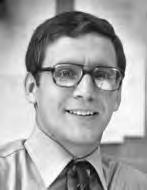
Bruce Burton died on June 11, 2022 at the age of 83. Dean Burton oversaw the school’s move to what is now the Mitchell Hamline campus. Read more about his legacy at mitchellhamline.edu/burton.
Meg Daniel, staff member
Meg Daniel died on August 3, 2022. Meg worked at Mitchell Hamline for 26 years. She served in many roles that supported students, faculty, and staff— most recently supporting associate and vice deans, along with faculty (and our many adjuncts) to make sure they had what they need.
“She made the dean’s suite a welcoming place for everyone,” said Dean Niedwiecki. “The school is a better place because Meg was part of it.”

31 MITCHELL HAMLINE LAW
IN MEMORIAM
What didn’t kill me made me...a lawyer
BY BRANDY MAI
Last November, I became an attorney in the same courtroom where I had once collapsed into a sobbing puddle after a judge shattered my world.
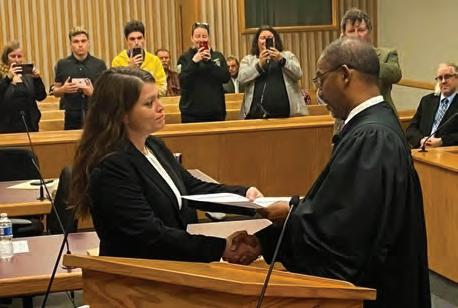
It was my request to be sworn into the bar by that same judge.
Six years earlier, I didn’t know how I’d pick myself up off that courtroom floor.
It began with a long custody battle that ended up in this judge’s court. It hadn’t been a great experience, so I publicly supported the judge’s opponent in an election. I filed for recusal when the judge referenced me on social media, but he refused and ruled against me a month later.
I lost custody of three of four of my kids.
Hundreds of bedtime stories and giggle sessions, gone. My daughter became essentially an only child who could only be with her entire family four days a month.
We lost our home and vehicles because of my new child support burden. I had lost everything (except weight) and struggled to find a purpose.

Then I heard my son ask his brother a question that changed everything: “Is mom going to cry the rest of our lives?”
A Life in the Law
I pondered what my children would remember if I were to die tomorrow. Me crying all the time? I couldn’t bear that legacy. So, I walked into the kitchen and emptied the bottles of booze I’d been drowning myself in. I spent the day laughing and loving them. And after dropping off my boys at their father’s, I sat on the couch, next to my daughter, and began researching law schools.
I quickly realized I couldn’t live any further from my kids, nor could I afford to quit my job to move for law school. I had almost given up when I found Mitchell Hamline, where I could attend an accredited law school partially online and take the bar in my home state. It was the unicorn I didn’t know existed. What I didn’t realize was that my Dad would die the week I took the LSAT.
I had visited him in the hospital but didn’t know he was that sick, even though he’d struggled with alcoholism and homelessness. I told him I was applying to law school and spent part of those days at his bedside solving logic puzzles. He was monumental in my life, in good and bad ways. He ended what would be our final hug by declaring “I always knew you’d be a lawyer. Good luck on your test. Remember, if you have time left over to double-check your answers.”
“Thanks, daddy.”
My dad was gone and so were, in many ways, my three boys when I applied to Mitchell Hamline. When I was accepted, I cried alone in my home for the four men in my life I was doing this for.
I wanted to become an attorney to help others avoid the grief I’ve felt. I also needed to begin to heal.
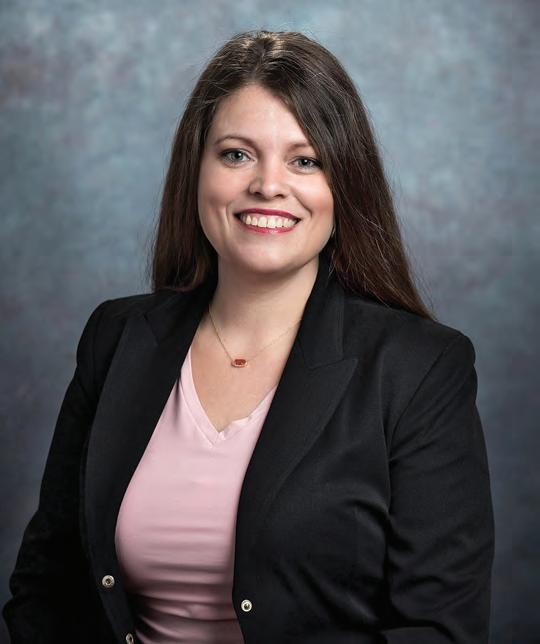
Through my grief, trauma, and attending law school during a pandemic, I made it.
The healing continued when I passed the bar exam and I made sure all my kids were there when I was sworn in by the judge who tore us apart. Not to gloat, but to start replacing sadness and grief with new memories, new beginnings, and making amends. And yes, the judge totally remembered me.
MITCHELL HAMLINE LAW 32
BRANDY MAI ’21 is an attorney and certified emergency manager in Savannah, Georgia.
Photographs provided by BRANDY MAI
“I can’t think of Mitchell Hamline without thinking of him.”
Remembering Doug Heidenreich ’61
BY TOM WEBER
The Mitchell Hamline community gathered in May for an event that former dean and longtime professor Doug Heidenreich probably would have found needlessly sentimental: His memorial.
But the event was more for the scores colleagues and former students who showered the school with accolades and remembrances following Heidenreich’s death on January 4, 2023, at the age of 90.
“He was the heart and soul of that place for so many years,” said Phebe Haugen ’72, a professor emerita and Heidenreich’s longtime friend. “I can’t think of Mitchell Hamline without thinking of him.”
Born and raised in St. Paul, Heiden reich graduated from William Mitchell first in his class in 1961 and joined the faculty in 1963—only to be named acting, then permanent, dean in the following two years.
He led William Mitchell for 11 years during a time of great growth and stepped down as dean just before the school moved to the current Mitchell Hamline campus on Summit Avenue. Heidenreich had worked to make that move a reality for years for a law school that had outgrown its space near the University of St.Thomas campus. After his deanship, he returned to teaching.
“Doug had little patience for things done in slipshod fashion and a willingness to speak his mind,” said professor
and former interim dean Peter Knapp. “Those were qualities that made him a wonderful, though occasionally intimidating, colleague.”
Heidenreich often described himself as curmudgeonly, but his many acts of generosity and respect to students and colleagues belied the reputation.

A notoriously hard grader, Heidenreich’s classroom ethos was rooted in challenging his students to be the best “because he knew their clients would rely on their expertise when they graduated,” according to Judge Colette Routel, a former colleague of Heidenreich’s.
“When he was nearing retirement, he continued to teach without receiving a salary, and then even after he retired, he continued to come to the office to tutor students who needed additional help.”
Heidenreich is survived by Haugen; his children, Lisa ’92, Beth, and John; five grandchildren; seven great-grandchildren, a niece and nephew; and cat Zoey.
When Lisa Heidenreich reported “less than spectacular” grades to her father after her first semester at William Mitchell, “he said that all that mattered to him was that I was there and that he was proud of me.
“It was at that moment I stopped being afraid of him and accepted the unconditional love and support that so many have known him for.”
Please consider contributing to the Douglas Heidenreich Scholarship to support Mitchell Hamline students.
Thank you for your support.
mitchellhamline.edu/drh
875 Summit Avenue St. Paul, MN 55105-3076
Follow us on Social Media
Facebook: @MitchellHamlineSchoolofLaw
Twitter: @MitchellHamline
Instagram: @MitchellHamline
LinkedIn: Mitchell Hamline School of Law
During a celebration in the 2010’s to honor Doug Heidenreich’s first 50 years of service to our law school, he recalled three pieces of advice he had once given to a graduating class.
“One, be proud of your law school. Be proud of this school; it is a very fine school and does wonderful things for society. Second, be honest. Third, ‘to thine own self be true.’”
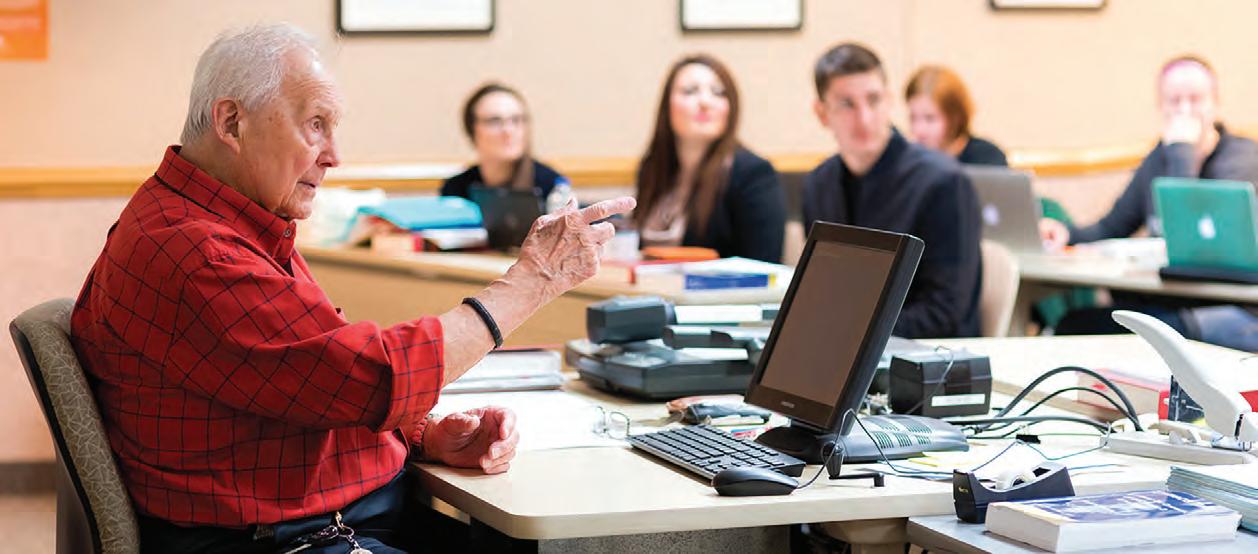
02027 2023-06 Nonprofit Org. U.S. Postage PAID Twin Cities, MN Permit No. 1300









 Professor Forrest Tahdooahnippah (Comanche Nation) teaching a class, September 2022
Professor Dr. T. Anansi Wilson speaks at the launch gala for the Center for the Study of Black Life and the Law, February 2023
Many of the 131 alums who passed the Minnesota bar in July attended a swearing-in ceremony at the state capitol, November 2022
St. Paul artist Donald Walker showcased his work in the art gallery, March 2023
Professors Carson, Strachan, Brantley, and Cobb set a style standard on their way to campus for the first day of class, August 2022
Professor Forrest Tahdooahnippah (Comanche Nation) teaching a class, September 2022
Professor Dr. T. Anansi Wilson speaks at the launch gala for the Center for the Study of Black Life and the Law, February 2023
Many of the 131 alums who passed the Minnesota bar in July attended a swearing-in ceremony at the state capitol, November 2022
St. Paul artist Donald Walker showcased his work in the art gallery, March 2023
Professors Carson, Strachan, Brantley, and Cobb set a style standard on their way to campus for the first day of class, August 2022












 BY RIHAM FESHIR
BY RIHAM FESHIR










 BY MARLA KHAN-SCHWARTZ
BY MARLA KHAN-SCHWARTZ














































































































































































































